These are reflections from a Hermitage with standing in the Russian Orthodox Church Outside Russia. They are not intended for parish churches but are rather snapshots of the spiritual life as the hermits understand it. They are offered in friendship to those who also strive for Christian conversion. We take to heart St. Paul's words:
|
And do not be conformed to this world, but be transformed by the renewing of your mind,
that you may prove what is that good and acceptable and perfect will of God. (Rom 2:12) |
And we follow the teachings of St. John the Theologian, having little contact with the secular world, only to the extent of ministry and farm business. The hermits do not participate socially, are not registered to vote, nor does the Hermitage have radio, television, or newspapers. The few people who do visit (mostly nuns, monks, and clergy) seek peace and sanctuary from the fever of the world. The Hermitage Farm, an enclosure of eight acres, is set apart for prayer and agricultural labors. The lives of the hermits revolve around our temple, Our Lady of the Angels, where our podcasts are recorded.
Following the precedent of the pre-history Irish and Scottish saints, the Hermitage has retreated from the world. Like our forebears who eluded Roman influence, the Hermitage is situated on the edge of the earth (an island most remote from any major land mass); at the end of the day, nearly 180° from the prime meridian; and removed from the secular world by thirteen days, following the Holy Calendar of Jesus and the Apostles. Humbly following the example of our forebears, we practice monastic life, serious study, spiritual writing, and labors on a farm — all done in a desire to stay pure that we might approach the light of Christ and share it .... in our case by means of the internet.
Americans say they want life, liberty, and the pursuit of happiness. But without God, none of these things will be possible. Without God is only death, enslavement, and eternal regret. C. S. Lewis wrote that "Human history is the long terrible story of man trying to find something other than God which will make him happy."
We do not suggest that God penalizes us for straying from Him. His heart is only to bless. He has always already predestined all to Heaven. But He has given us the precious gift of freedom, which equates to sovereignty over our lives. We have the final say. The destinations we choose are of our own devising. Freely, we may reject Him and His marvelous world of holy life, which is the Kingdom of Heaven. Many have rejected Him. The place of willful separation from the family for which we were all born is called Hell.
What is the next thing people do when they encounter God? They seek to learn, to be guided, to compare notes. This is our ministry: to meet with these pilgrims, to offer guidance, to offer learning, and to assure them that the unbelievable things they have seen and heard are to be believed, indeed, are the only reality. This is the spirit of the "snapshots" we share. We pray they will be helpful.
If you appreciate the many hours of prayer and study which are the foundation for these reflections, please support our efforts as you can. We receive no funds from the Church. No one at the Hermitage receives any kind of salary, neither the Hermits or Board members of our non-profit corporation. Please be part of ceaseless work to bring godly life into a world descending into darkness.
Nota Bene:
The Hermitage grants permission to our readers & listeners to download our reflections
and pass them on to others.
Copyright © by the Holy Spirit.
![]()
These days are particularly holy to the Hermitage, for it was during these days in 2019 that we were Illuminated, Chrismated, and our priest Ordained in Holy Orthodoxy.
We sought the Russian Orthodox Church Abroad (ROCOR), for she was formed in the fires of atheism and progressivism and never wavered.
This may seem like an abstraction to many, but to monastics and clergy who have lived in helpless obedience to cruel masters devoted to the gods of this culture, it is very real.
Finally, to cooperate with evil, formally and materially, was too great a burden to carry any further.
To live holy lives, to pray holy prayers, to say the holy words of Eucharist with a clear conscience and with clean hands ..... what else is there in this evanescent world?
And to show others this way to Eternal Life .... what greater work of mercy?
Here on the anniversary of our salvation, the Hermitage has received a new name: Hermitage of the Surety of Sinners Icon of the Mother of God (also called Surety of Sinners Hermitage). Henceforth, our website with be
sos-hermitage.org,
and I will receive email at
frcolumba@sosih.org.
Please offer a prayer of thanksgiving and rejoicing for our peace.
I am put in mind of a prayer from our spiritual heritage:
Be present, O merciful God, and protect us through the hours
of this night, so that we who are wearied by the changes and
chances of this life may rest in your eternal changelessness;
through Jesus Christ our Lord. Amen.
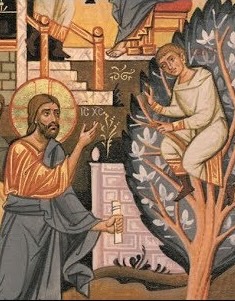
Download Podcast: download="Salvation.mp3"
St. Luke remembers. He remembers what it was like to throw off his worldly glory and dignity and gravitas in order to enter a new world, the world of a disciple of Jesus. He wanted the heart of the Master to beat in his own breast. He wanted the thoughts of the Master to be his own thoughts. He wanted to look out on the world and cherish what the Master cherished. He wanted to become a lamb of God, (as the Baptist had said). He wanted to be a pure one.
No wonder, Jesus had said that we first must first burn down our whole world in order to become His follower. For He asked no less than the board of health: burning all our clothes and possessions and perhaps even our house in order to eradicate a virulent plague. Certainly, this plague still holds most of humanity in its deadly grip.
In todays' Gospel lesson, Jesus uses the word "salvation" (soteria) which mean "safe return." It summons up visions of innocent Eden. But how does one get there? We get there by a complete transformation (metanoia) of who we are, what we think, and what we value. And it must happen from within. God can guide us. But we must do it.
St. Luke captures all of this in one of his famous icons. Read on, this Zacchaeus Sunday, for rejoicing is just ahead. Today salvation has come!
![]()
Download Podcast: "Fulfilled.mp3"
Here on the leave-taking of the Baptism of the Lord and of St. John the Forerunner, we remember that Jesus said of John, no prophet was greater. The Baptist is himself the culmination of prophecy, and his life continues to contain within itself all the elements of spiritual struggle, of spiritual sacrifice, of purification, and of union with God.
He was the man of Eden who came back into the world to lead us to Paradise, into a journey of theosis unto union with God, which is our first state.
Inevitably his vocation was one of spiritual warfare. His principal opponents were demons who found harbor in the passions of cooperating men and women. But he is eternally the victor, and even now he shows us the way through these burning streets into safety and ultimately to the pastures of Eden.
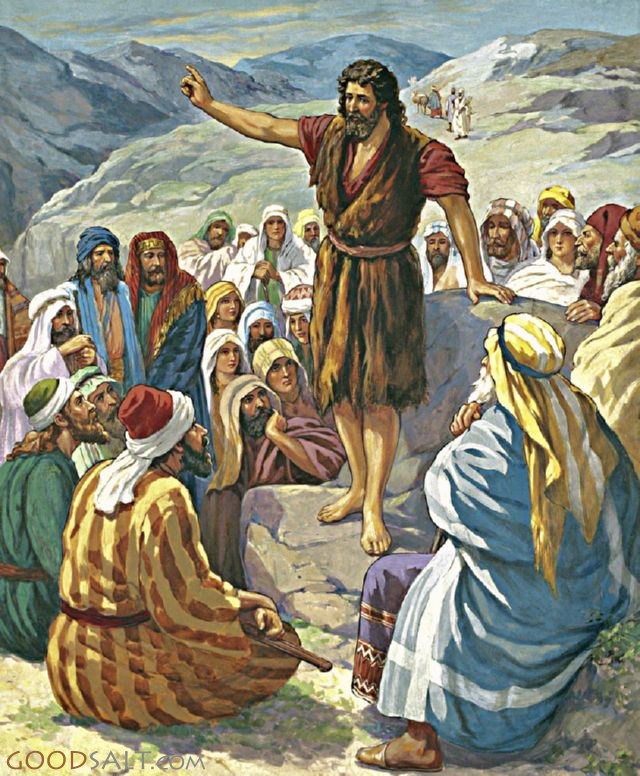
Download Podcast: "ToEden.mp3"
He hung on the Cross, the great Compass, which would set direction for all humankind. The four Greek letters announcing the cardinal points of the compass spell "ADAM," for Eden was the good beginning: the place where God set His Image upon humans, the Image of the Son of God, upon humankind. Untarnished. Bright. The fullness of God. Eden.
What is salvation? What is the fullness of divinity with the human person? What is perfect union with God? Eden. The completion of our sanctification and the end point of our journey of theosis mark the return to Eden.
If God were to send a Forerunner, a human messenger, to announce a return to goodness and to union with Him, what would he look like? What appearance must he have, what tone must he sound in order to ring true? He would be a man from Eden. And he was.
Just being near to him one could detect a faint fragrance, a strangely familiar scent, stored in the deepest recesses of our racial memory. It was a goodly scent pouring balm upon the spirit and enlivening the cells within. It was the sweet air of Eden. Among those who saw St. John the Forerunner, there was no doubt as to his identity: dressed only in natural clothing, having no spot of the corrupt city life upon him, eating the perfect food of honey cakes called manna. As the Greek word for this manna, ενκρίς / enkrís sounds very much like the Greek for locust ακρίς / akrís, we have been handed the ridiculous image of this vegetarian from Eden preying upon insects!
Who could possibly be a more perfect image of preserved Israel than this man of Eden? The preservation of pure humanity. Preserved, like a creature from a prehistoric time, frozen in clear amber, perfect in every detail: St. John the Forerunner.
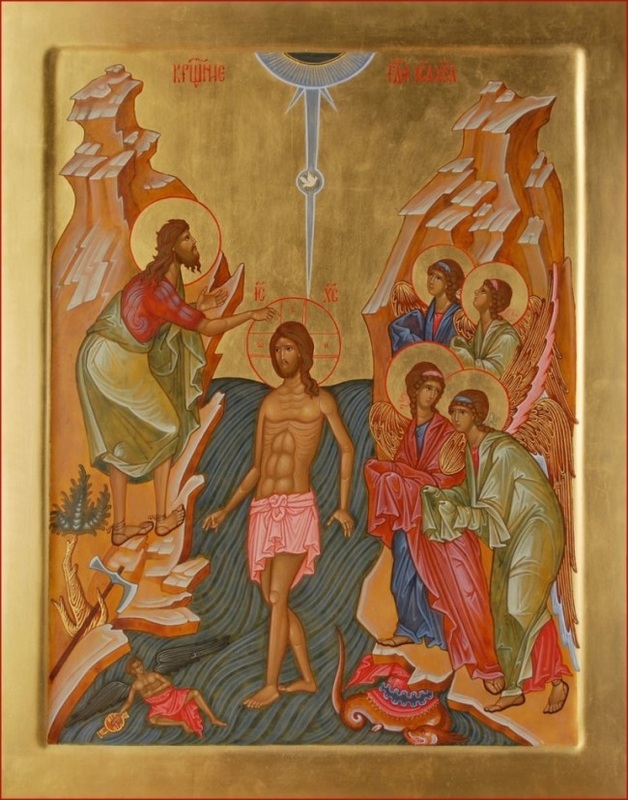
Download Podcast: "Behold.mp3"
At the first creation, God ordered the heavens and earth out of the void of chaos, but He did not do so permanently. And following man's fall from grace, the creation has retained a flaw in God's good masterpiece. Physics has discerned and common experience has attested the persistence of chaos. In fact, disorder is the dominant trend and theme of our world.
At His second creation, the Logos once again stands before chaos. Icons of the the Baptism of the Lord depict Him as Master over the elements. He is Present in the Fullness of the Holy Trinity. But it is not primordial chaos He faces, but rather moral chaos, which is the great and permanent decider of eternal death or life.
He has appeared once again, this time among us, to cleanse, to transform, and to guide us into the Kingdom of God, which He says, is at hand. His Baptism is nothing less than the second Genesis. But will we attend, will we reverence it as incommensurably holy? Or will we ignore it as we ignored Him when He came to avert the greatest catastrophe the human lifeworld could ever know, which is eternal death?
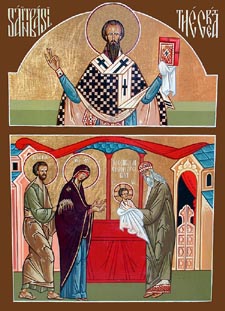
Download Podcast: "Named.mp3"
The cult of human insignificance and unworthiness is the devil's invention and weapon. Yes, many good people have fallen into this trap. We must not think less of them for that. But it is a trap. Do not the Scriptures declare the wonder of God's precious human creature, Whom He loves so completely and so well? This is the story of the Bible. Certainly, the Orthodox Church does not affirm the Calvinist doctrine of essential human unworthiness and depravity. The ancient Church has not embraced St. Augustine's doom and gloom of Original Sin. Metropolitan Antony Khropovitsky, the initial overseer and First Hierarch of the Russian Orthodox Church Abroad, deplored this error and the many errors that proceeded from it.
In fact, the Church affirms the worthiness of Humankind — that our essential purpose in life is to accept God's offer of Friendship and to enter into the work of Deification, or Theosis, to embrace the goodness God has set before us and to give a wide berth to evil and nihilism, which is a noble and free choice. Is this not the teaching of the Orthodox Church?
God has called us to His wonderful light. He has already issued this invitation to each and every one of us. Let our apostolate be the Possible, the Believable, and the Trustworthy. And let us hear no more about being a speck, a nothing, and the most lowly among all. For we are named before God. And He has bigger plans for us than speck-hood.
In the New Testament, we see that the ritual of circumcision gave way to the Mystery of Baptism to which it is essentially linked. The Feast of the Circumcision of the Lord is attested in the Orthodox Church through the fourth century. The Canon of the Feast was written by Saint Stephen of the Saint Savva Monastery.
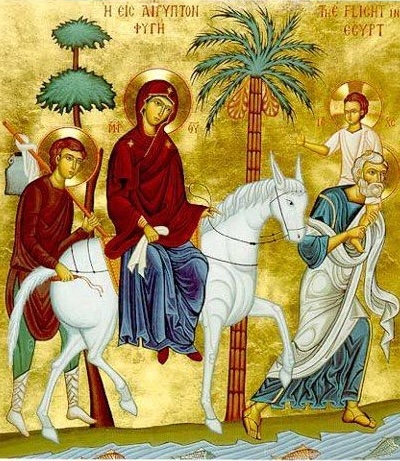
Download Podcast: "GodsEye.mp3"
Today we celebrate the Feast of St. Joseph the Betrothed, David the King, and James the Brother of the Lord. The Gospel reading for this feast contains the only historical record, recounted in full, of the Slaughter of the Innocents, which the Church commemorated yesterday.
Why is this feast observed so close to the Great Feast of Christmas? And why should a holy day remembering Joseph the Betrothed, King David, and the James the Just include the Slaughter of the Innocents? Surely part of the answer must lie in the collision between two royal lines — the lineage of King David, the anointed of God, which includes Joseph and his two sons, one by birth and one by adoption contrast with the lineage of a counterfeit line, the Herodians, who were Arabs. The Slaugher of the Innocents was merely the latest among Herod's desperate measures to cling to a throne he had no right to.
Here is a strange tale of the man who would stop the Advent of God. He would turn back God's plan to heal the Creation with Innocence itself, and responds by stamping out all Innocents .... at least all males two years and younger. Here madness lies and murder and the executions of his sons and his wife. Here lies the territories East of Eden. Here is the world into which the Holy One is born.
![]()
Download Podcast: Wonderful
Love is born among us — Real Love that cares and suffers and will be with us to the end. For that is the world He sees. That is the world He has come to redeem: where real men and women live and strive and fail and have need of friendship. We cannot have real joy, not when so many suffer. We cannot rest until the last one has been saved.
That is the world that He sees. That is the world into which He was born. And those who love Him, those who follow Him, can do no less than roll of up their sleeves and with cheerfulness do the work He would have us all to do.
So bear His yoke, pick up your cross, and on Christmas Day start off on a new road, becoming His gift of love and caring to the world.
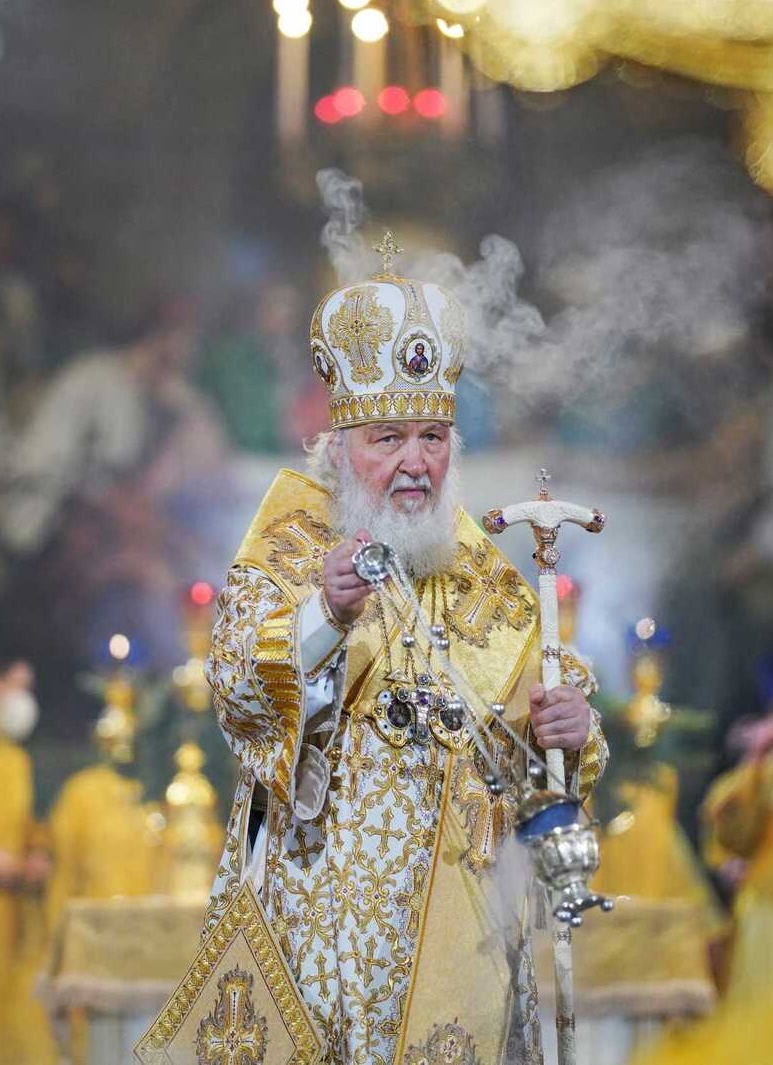
December 25, 2024, Holy Calendar (January 7, 2025, N.S.), Nativity Epistle of His Holiness Kyrill
Nativity Greetings from His Holiness Kyrill, Patriarch of Moscow & All Russia
to the Archpastors, Pastors, Monastics, & all the Faithful Children
of the Russian Orthodox Church
Your Graces the archpastors, all-honorable presbyters and deacons,
God-loving monks and nuns, dear brothers and sisters,
Offering praise to God glorified in the Trinity and sharing with all of you the joy of this feast, I convey to you, the Orthodox children of our Church living in Russia and other countries of the Moscow Patriarchate’s pastoral responsibility, my heartfelt greetings on the Feast of the Nativity of Christ, which is the celebration of the Maker’s incarnate love for His creation, the fulfillment of the promise of the Son of God’s coming into the world and the hope for salvation and life eternal.
A great and most glorious wonder is wrought today: A Virgin giveth birth, yet her womb suffereth no corruption! The Word is incarnate, yet is not separated from the Father! Angels give glory in company with shepherds; and with them we cry out: “Glory to God in the highest, and on earth peace, good will toward men!” (Sticheron of the Feast). With these words the Church bears witness to the mysterious event which occurred more than two thousand years ago in the cave in Bethlehem and altered the entire further course of world history. It is with a sense of amazement and awe that we incline the knees of our hearts before this mystery of the Divine plan for salvation, incomprehensible to human mind. It is with gratitude that we accept this sacrificial gift of the Maker and Provider, for it pleased Him to do so for our sake, and confess His grace, proclaim His mercy, conceal not His gracious deeds (cf.: the Great Blessing of Water).
What then are we, twenty-first century Christians, to do in order to become partakers of this truly precious act of God’s loving-kindness and to be counted worthy of His kingdom prepared from the foundation of the world (Mt. 25:34)?
All we can and must do is respond in kind to His love. And this means to believe and fully trust God, to observe the Gospel commandments, to turn away from evil and do good (Ps. 33:15), to be, as the Savior calls us to, the light of the world and the salt of the earth (Mt. 5:13-14).
Endowed with free will and the inalienable right to choose, any person may accept Christ or reject Him, be on the side of light or plunge into the darkness of sin, live in accord with their conscience or after the rudiments of the world (Col. 2:8), through good works create paradise within their hearts or, by contrast, in doing evil experience already here on earth the torments of hell. In other words, each of us is called to joy and the fullness of life or, put simply, to happiness. And happiness (it is vital to realize and understand) is impossible without God, for He is the fount of life and all good things. He is the Maker and Provider, He is the loving Father, our caring Helper and Protector. Having free will, we can choose life and attain the likeness of God, but we are also free to choose for ourselves a different, godless and graceless way of life that leads to perdition.
For this reason the Lord, Who created us, nonetheless does not save us without our participation. It is in the harnessing of the will of God – what is good, and acceptable, and perfect (Rom. 12:2) with the human will, albeit imperfect yet striving towards the good, that we have the pledge of a successful journey through our earthly life. Life everlasting for every one of us, ultimately, is the continuation of that spiritual condition which characterized us in our earthly life.
Mindful of this, let us, as the Apostle Paul says, strive to acquire within ourselves love, joy, peace, longsuffering, gentleness, goodness, faith, meekness, and temperance (Gal. 5:22-23) along with other gifts of the Holy Spirit. Let us do everything possible to remain Christians not only in name but in our way of life, in how we treat our relatives and friends, our colleagues and co-workers, and every human being who is in need of our help and sympathy, compassion and support.
Every day, and even more so on this great feast, we are called to pray ardently for the peace of the whole world, for the good estate of the holy churches of God, for the sick, the suffering, the captives, and for their salvation. These petitions are of great significance today, for the powers of evil which desire warfare and division have risen up in arms against Orthodoxy. They sow enmity and hatred, exploiting any means to implement their cunning designs. Yet we believe and hope that the power of God will put to shame all the powerless boldness of demons and their henchmen. Thus it was many times in our history, and so it shall be now. The centuries-old experience of the Church assures us of that.
I express my special gratitude to all those who, carrying out their pastoral ministry in the territory of Ukraine, remain faithful to canonical Orthodoxy even at the risk of their life and health, who fearlessly tread the path of confessing Christ, who endure vilification and affliction for Christ and for the Church. May the Lord help these courageous defenders and champions of the Truth in their hardships and may He count their sufferings as righteousness.
All this notwithstanding, we are united in spirit. We are one, for we have emerged from one baptismal font. We are one, for together we manifest the fullness of the One, Holy, Catholic and Apostolic Church. We are one, for we are linked by the indissoluble bonds of love in Christ. We are one, for inviolable are the words of Christ, Who said: I am with you always, unto the end of the world (Mt. 28:20). That is why we Christians have nothing and no one to fear, as Saint Paul reminds us in his exhortation: If God is for us, who can be against us? (Rom. 8:31). Inspired by this promise, we live and create, we struggle and vanquish in the name of the Lord, for as the Holy Apostle Peter says, there is none other name under heaven given among men, whereby we must be saved (Acts 4:12). There has not been, there is not, nor shall there ever be, as the Church testifies.
Since the coming of the Lord into the world and to this day, all those who believe in Him are given the opportunity to be children of the Heavenly Father, for, as Saint Paul says, now we are no longer strangers and foreigners, but of the household of God (Eph. 2:19). This means that we are all His children, and that in Him and through Him we become closer and dearer to one other.
In the divine services and sacraments of the Church, which serves as the meeting point between the human person and the Maker, the veil of eternity is drawn aside for us and here, on earth, we receive a foretaste of the coming fullness of life when, according to the Holy Scripture, God will be all in all (I Cor. 15:28), when no one and nothing shall be able to separate us from the love of God (Rom. 8:39), from the joy of communion with Him, when God shall wipe away all tears, and there shall be no more death… for the former things are passed away (Rev. 21:4).
In proclaiming to people the glad tidings of the Savior’s coming into the world, the Church, like a loving mother, exhorts everyone to believe in Christ and live according to His covenant so that we may become inheritors of eternal blessedness. Truly, the Lord has come to earth so that He may raise us up to heaven. He always encourages people to follow the path of spiritual and moral transformation which is attained through fulfilling the Gospel commandments, through the voluntary cooperation between the human person and God, through the participating action of His grace, sent down in the sacraments of the Church.
And if in our relationships with people, in our everyday affairs and concerns we learn to be guided by the divine ordinances, then many things will change both within and around us. Life will acquire true meaning and be filled with real joy and happiness.
Let us then be worthy of the Christian name and calling. Let us tread our path through life with steadfast faith and unwavering hope in help from above, joyfully welcoming every new day and every new opportunity to perform good works, showing love for our neighbors and giving thanks always for all things unto God (Eph. 5:20), to Whom belong all glory, honor, and worship unto the ages of ages. Amen.
I greet all of you, my beloved, on the Nativity of Christ!
+KYRILL
Patriarch of Moscow & All Russia
The Nativity of Christ
2024/2025 A.D.
Moscow
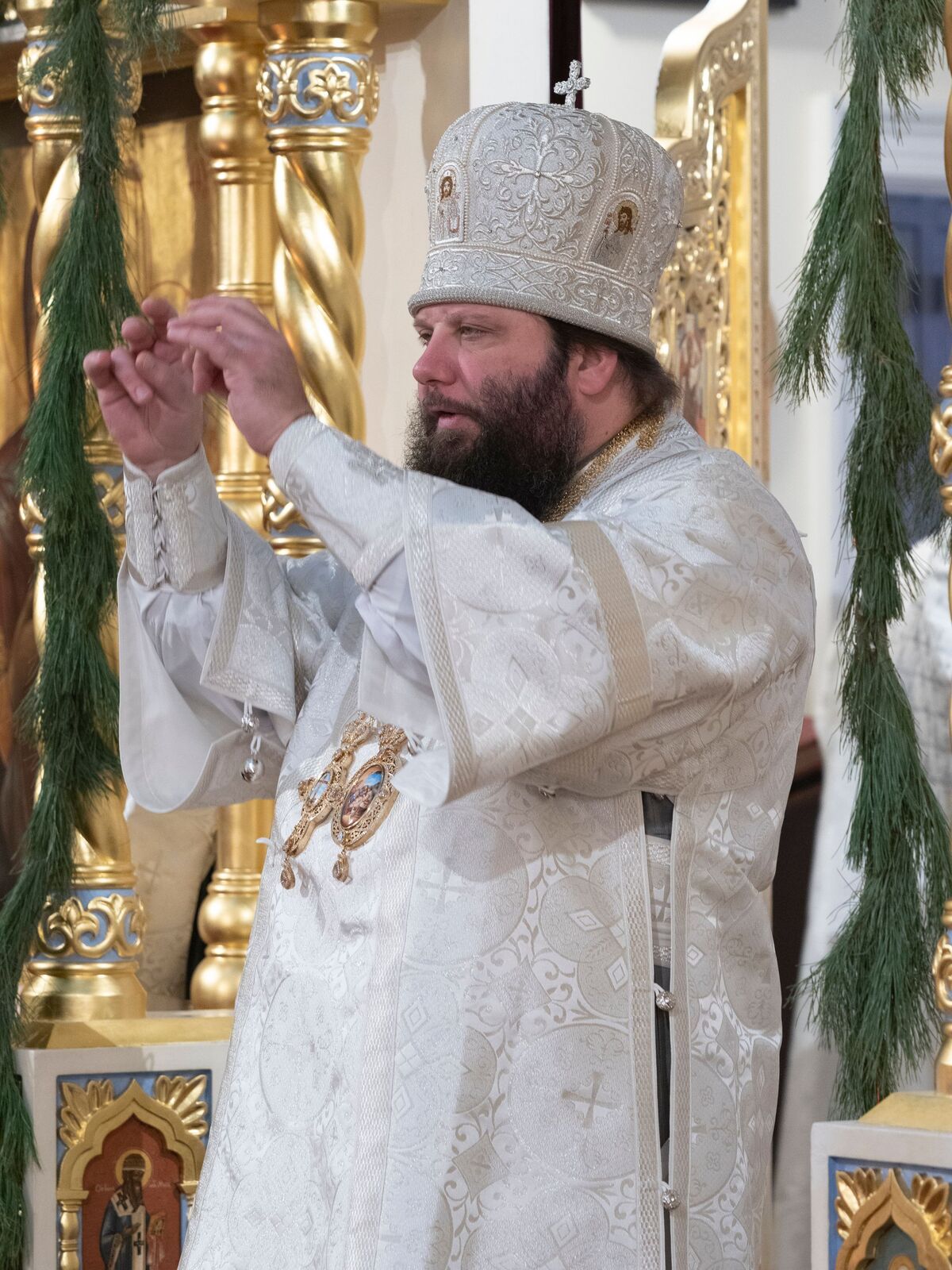
December 25, Holy Calendar (January 7, N.S.), Nativity Epistle of Met. Nicholas
Eminent brother-archpastors, reverend fathers,
beloved brothers, sisters, and children in the Lord!
With a feeling of rejoicing in the Newborn Christ, I greet my brother-archpastors, reverend fathers, monastics, and all the faithful children of the Russian Church Abroad with the feast of Christ’s Nativity, salvific for the world, the Theophany, and the New Year 2025, fervently wishing everyone all-strengthening joy in the Son of God’s coming into the world.
These past years have been difficult and sorrowful, but they also brought us every kind of blessing, for which we ought to offer up thanks to our Benefactor. We have attained to this festal period because God’s Providence has not forsaken us. If we have been able until the present time to bear the obligations placed upon us, this is only because the Lord Himself has given us health, strength, food, drink, clothing, and together poured out upon us His help in walking the path of our lives.
The Lord, as we see in the life and Primatial service of the Holy Hierarch Tikhon, Patriarch of Moscow & All Russia, who died on the feast of the Annunciation in 1925, never forsakes those faithful to Him. During the memorable period of his Patriarchate, St. Tikhon, as was the case with the multitude of new martyrs and confessors, found within himself the strength from God to boldly, wisely, and simply answer the militant godless. The example of the holy hierarch demonstrated that the Church continues its service both in times of prosperity and, especially, in periods of persecution, confession, and martyrdom. All attempts to destroy Christ’s Church have failed to yield the desired result. We see this in the events of that time, as well as in the current lawlessness being waged against the Ukrainian Orthodox Church.
Through the prayers of the Holy Hierarch Tikhon, who reposed 100 years ago, may the Lord help us, as we reflect on the past, to see and soberly evaluate the present, and with sure hope to forge ahead into the future, feeling "the mighty hand of God" (I Peter 5:6) upon us, leading us to true happiness!
Christmastide always evokes feelings of deep love and gratitude in a faithful heart. In these days, let us also raise up our prayerful thanks to God, offering our love to Him and our neighbors. Gratitude and love are always a sacrifice. These are the two mites of the Gospel widow. And so, I ask all who can do so to give your Nativity gift toward the preservation and restoration of the historic Synodal Headquarters in New York City, the Home of our main holy icon – the Kursk Root Icon of the Mother of God "of the Sign," which appeared 730 years ago. The Holy Hierarch Tikhon, along with the Holy Hierarch Raphael of Brooklyn and the Holy Hieromartyr Alexander Khotovitsky, walked the streets of our neighborhood in Manhattan, while Metropolitan Anastassy (Gribanovsky), who labored alongside the holy Patriarch-Confessor, purchased this mansion with the help of his spiritual son, in order to establish within it the Cathedral of the Sign and the spiritual and administrative center of the Russian Church Abroad. The Holy Hierarchs John (Maximovitch) and Nikolaj (Velimirović) stayed and served here. Councils of Bishops, clergy conferences, church-social functions, and other historic events took place here, as well as the glorification of St. Tikhon, together with all the new martyrs and confessors of the 20th century. Therefore now, offering up our thanks to God and His Most Pure Mother, let us try to manifest it also in caring for the preservation of our legacy, this great gift of God, and the Lord will not forsake us. For a grateful man will certainly be found able to receive even greater gifts and mercies from God, which I wish for our Church with a good heart. Amen.
With love in the Newborn Christ,
+NICHOLAS
Metropolitan of Eastern America & New York
First Hierarch of the Russian Orthodox Church Outside of Russia
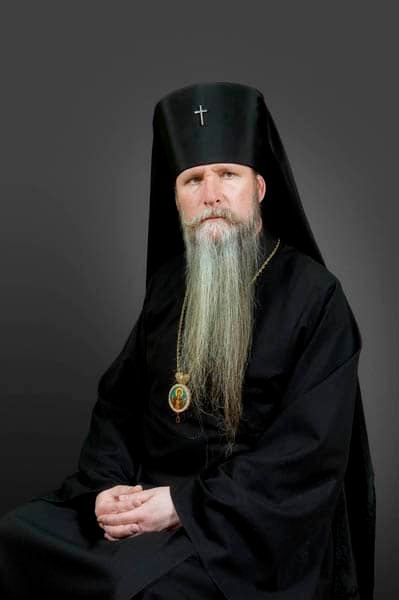
December 24, 2024 Holy Calendar (January 6, 2025, N.S.), Nativity Epistle of Archbishop Kyrill
Glory be to God in the highest,
and on earth there is peace,
there is favor in people.
(Luke 2:14)
CHRIST IS BORN! GIVE HIM PRAISE!
Your Grace, Honorable Fathers and Beloved in Christ!
Christ was born into this world with a single purpose only: to redeem the fallen nature of man and to offer man again the gift of complete communion with God, as in the Garden of Eden. Saint John of Damascus writes: "The Son of God became man in order to bless man again, as it was when he was created." God became incarnate, through Jesus Christ, to divide us into a mystical oneness, that knows no limits in time, space, or any other framework that our weak understanding can conceive. The intention of God for us is a union of love that is unbreakable and steadfast. However, we try in every way to destroy and divide this relationship through our sins against God, our fellow men and God's creation.
How often in our daily lives do we exclude Christ from our hearts and minds, allowing destructive thoughts and actions to take over us? We all rush to the Lord and beg for His mercy and attention when trouble comes to us, but when everything is going well in our lives, or in the daily bustle of life, we forget Christ and our faith. We let everything else take the lead in our lives - work, rest, family disputes, friends, politics, money concerns, etc. п. However, when it comes to God, we don’t allow Him to take the lead role in our lives, placing the temporary above the eternal joy that is only available to Him.
Beloved brothers and sisters, with the Christmas of our Lord, let us begin to correct our ways. Let's make a conscious effort to focus more on Christ in our everyday lives. Let's remind ourselves that Jesus Christ took on our flesh, that He understands us and wants to help us in every aspect of our lives, not just in moments of trouble. We must remember that Jesus Christ calls us to be with Him, saying, "... I have called you friends because I have told you everything I heard from my Father." (John 15:15). We have a wonderful gift as Orthodox Christians — to get closer to God. So we will not waste our time and energy on things that will soon become meaningless and disappear.
+ KYRILL
Archbishop of San Francisco and Western America
Christmas in the flesh of our Lord, God and Savor Jesus Christ
December 25, 2024 / January 7, 2025
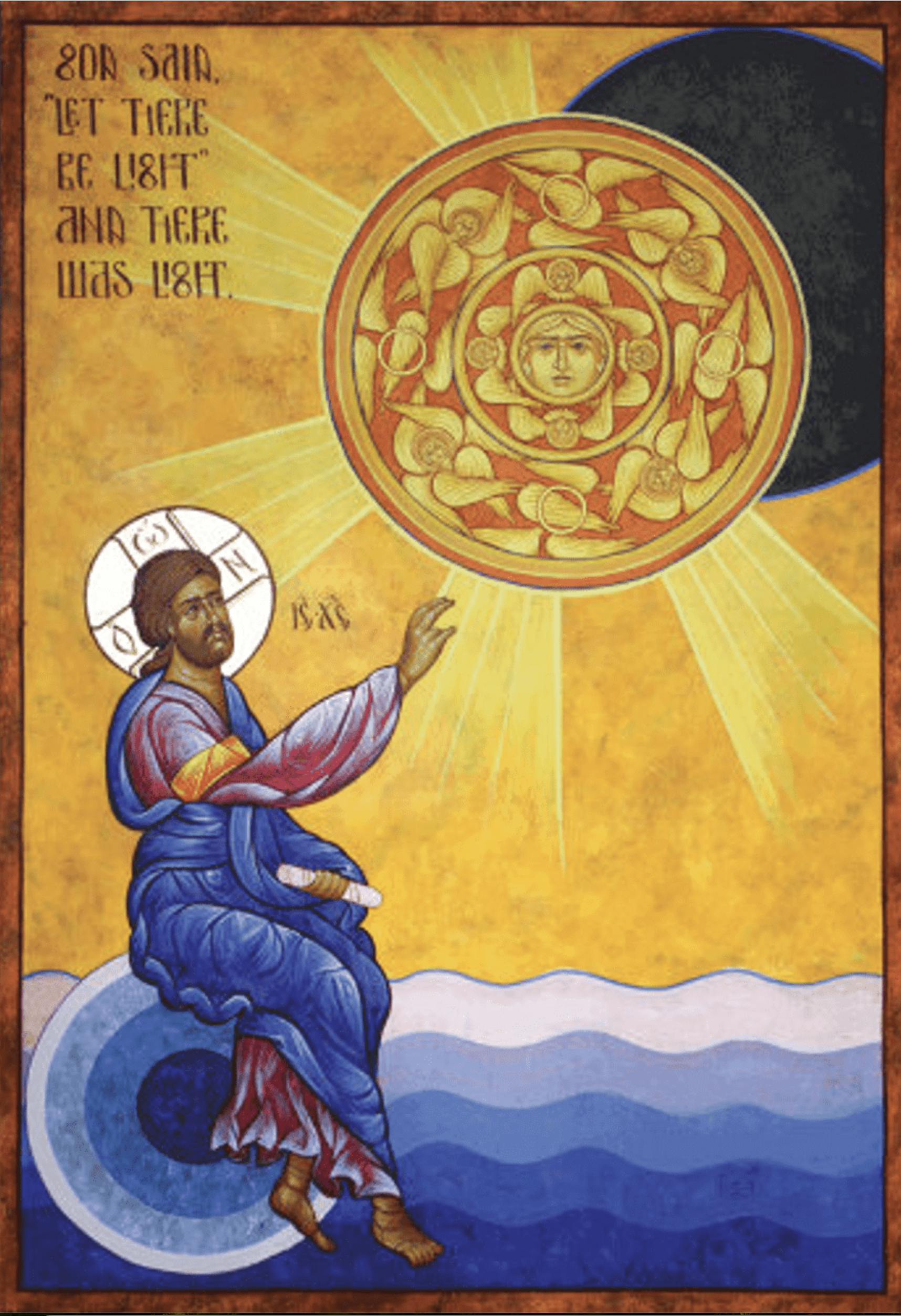
Download Podcast: Light-Giver
Jesus is born to a strange sort of family tree. Actually, He inherits it by adoption. Some names we read down through the ages stand out as being notorious, not uncomplicated paragons of virtue. And, beyond family trees, the immediate circumstances of His birth are unvarnished degradation and homelessness: barnyard animals with their mud and dung-stained hay and a crib fashioned out of a manger, that is, an animal's wooden feeding trough. As this is part and parcel of frank inhospitality, we may well imagine that there is no place to wash or relieve other needs.
Yet the One Who knows all and understands everything has come of His Own free will. He does not have to be schooled in the ways of our world. For it is our sorry state and the many who suffer that have cried out to Him. He has come to save and to redeem.
And He will transform the family tree that He received as His Nativity. He will transfigure it into a birthright to Heaven and adoption by Father God. He has come to bring light and new life. And He still does. Who will not raise up his head or walk away from her shameful secrets to claim this legacy, this inheritance to riches beyond our furthest dreams?
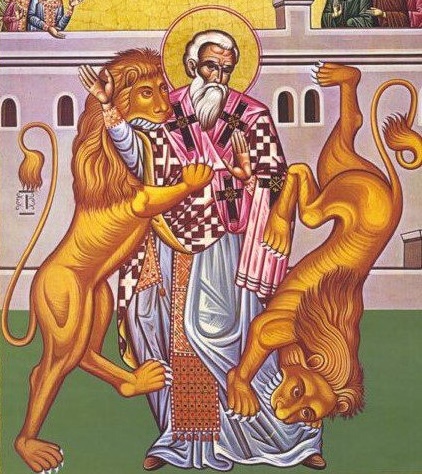
January 2, 2025 (December 20, Holy Calendar), St. Ignatius of Antioch
He quipped, "I give thanks to the lions who have spared those I love the chore of preparing my body for burial." His Letters to some of the early churches are a treasure house of Patristic doctrine based on Scripture.
He first proposed the Communicatio idiomata (the communication of properties), which is the foundation underlying Theosis.
He wrote, "Where the bishop is, there is the Church" anticipating the danger of wandering, free-lancing priests.
He laid the groundwork for the three-fold ministry, noting that bishops and deacons are established by Scriptural warrant, and priests are constituent parts of their bishop (symbolically carrying particles of the bishop's fermentum to the communities of the faithful.
He is third in the Patriarchal line of Antioch following Peter and Evodius.
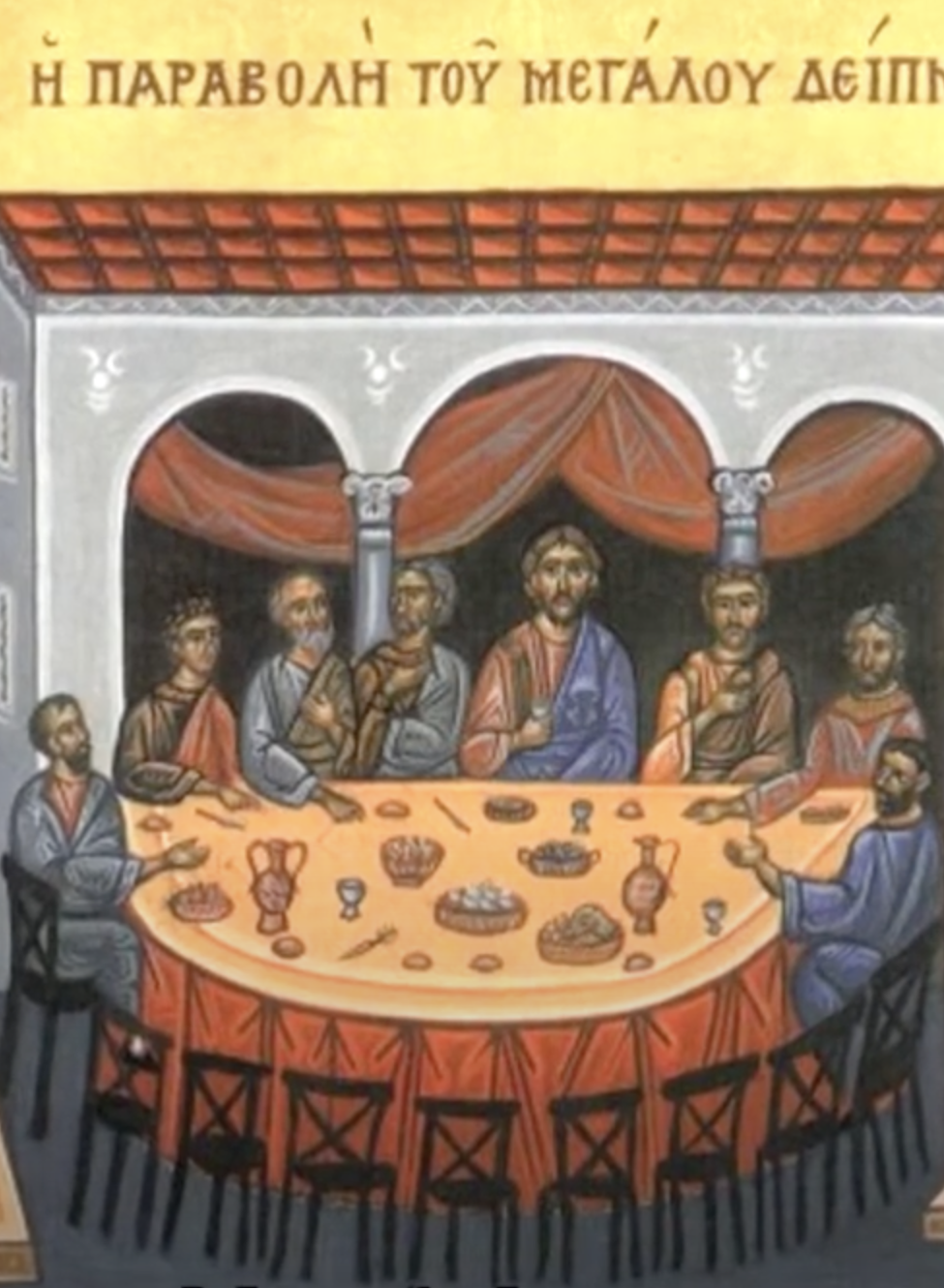
Download Podcast: Bread in the Kingdom
We have spoken about living in God's Now. "What is the time zone in Heaven?" It is Now. Always Now. Where and when have no place. No plans are necessary, for there is nothing left to achieve. All has been fulfilled. Regrets for yesterday and fretting for tomorrow no longer make sense. Heaven is the Now that has no end, where living present to the living God is our all.
But there is another Now we must not neglect. It is not declarative or indicative grammatically, but rather imperative. It is God's command. As distracted children we were are familiar with this command: "Now!" And it might have been followed by other words: "And I don't mean later!"
Doesn't this go to the heart of our Gospel lesson this morning? "A certain man has prepared a great feast and invited many." The rest of the tale we know. The intended guests behaved childishly giving the sort of excuses one is apt to hear from whining teenagers: "I'm busy." What is this mysterious meal to which to which so many have been invited? It is revealed in the verse preceding our Gospel reading:
"Blessed is he who shall eat bread in the Kingdom of God!" (Lu 14:15)
The moment for which all the Creation longs has reached fulfillment: the feast in the Kingdom of God. But the intended guests have fallen into "the trance of the world," where the insignificant has come wholly to preoccupy them.
Join us as we reflect upon that most common experience of the spiritual life: deadness.
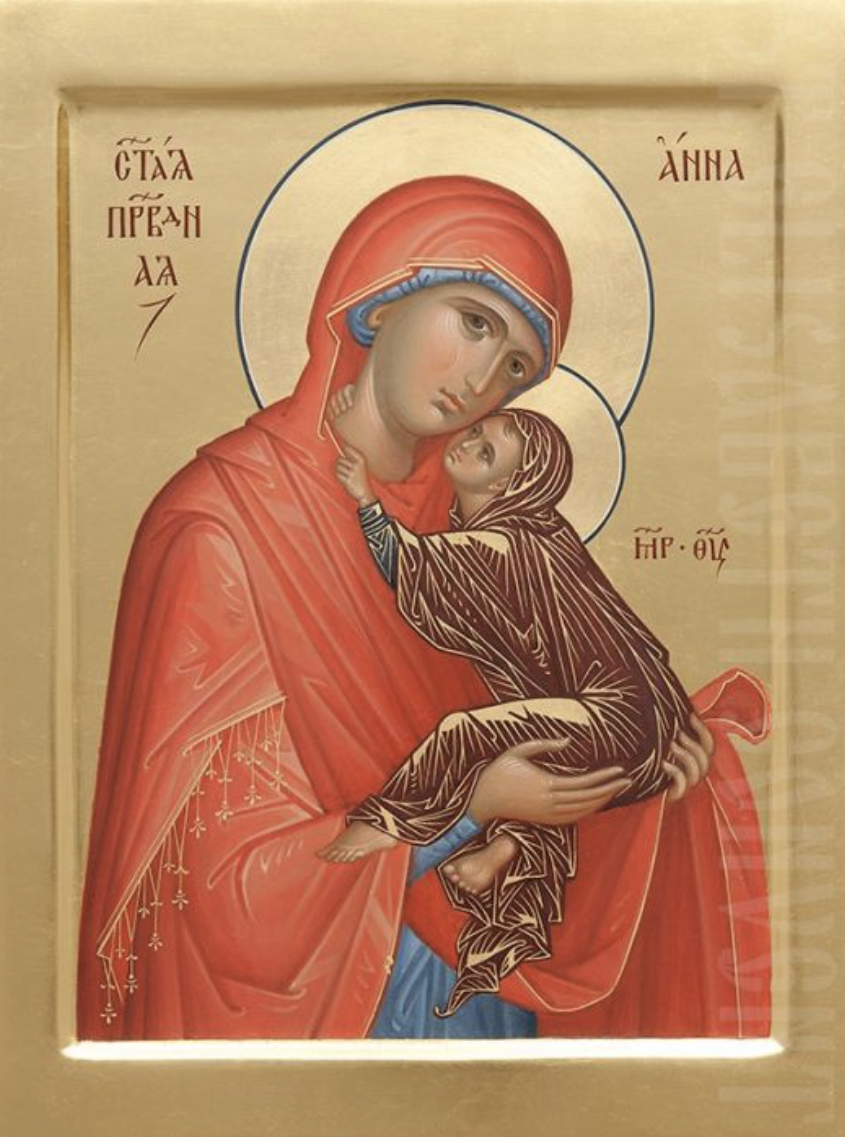
Download Podcast: Family Tree
Today we commemorate a great feast: the Conception of the Most Holy Theotokos by St. Anna. With this, the final three generations of a geneology are announced. In fact, Sacred Tradition holds that St. Anna is the daughter of a priest and a descendant of the Tribe of Levi. All things have been made ready for the birth of our Great High Priest.
But the brief Gospel reading for this feast day depicts Jesus as brushing all this aside. The only genealogy worth recording, He says, is our descent from the King of Heaven. What is more, He offers that royal lineage to us. All we need do is stand ready to receive God's command and do it.
Pray for us, St. Anna, for we long to receive God's word and to have a place in His and your and your Holy Daughter's family tree.
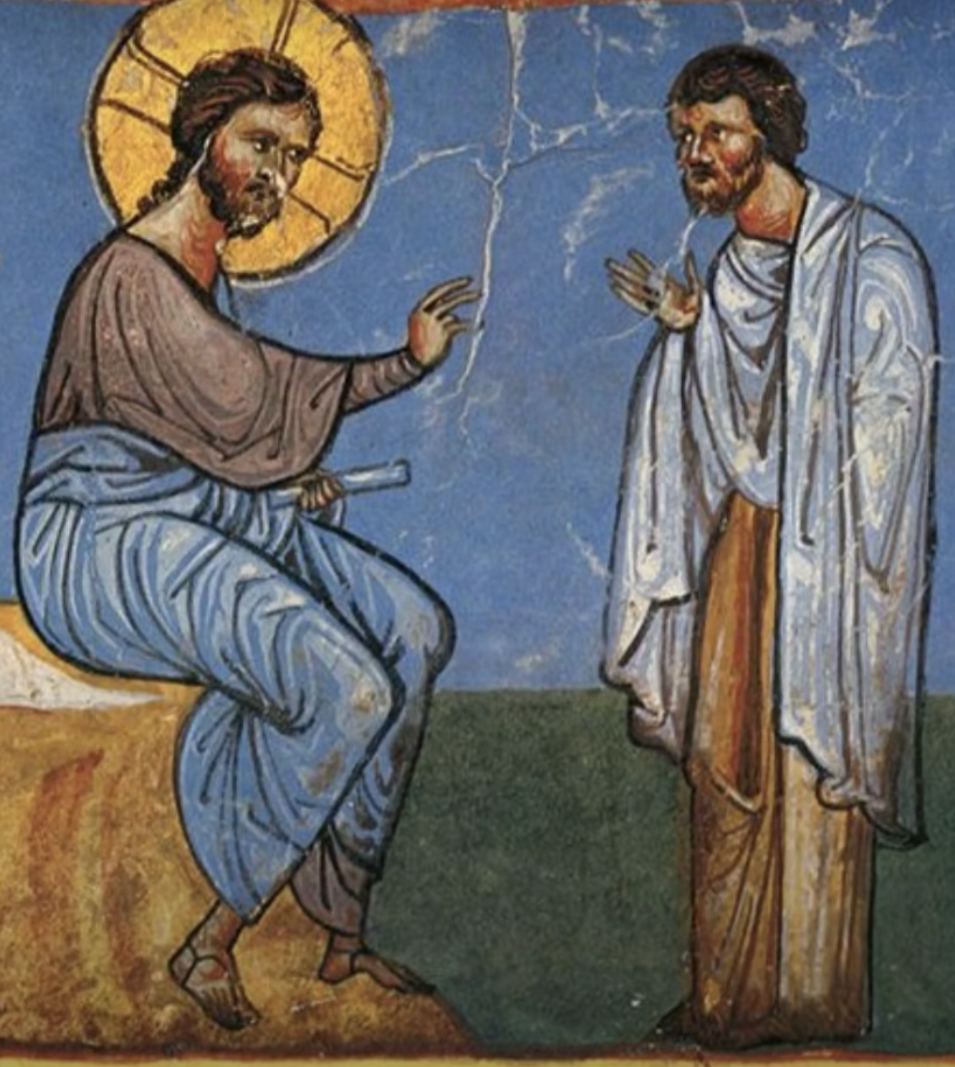
Download Podcast: "The Imagination of Their Hearts"
God is interested in this world only insofar as it leads us to His Kingdom. God sees the fullness of time. He sees everything in the light of the Eschaton. And in that light our vain imaginings instantly vanish. Our frames of reference, on which we have relied for self-justification; our possessions, our furnishings, our plastic surgeries which have propped up our false identities; our class status and worldly importance .... all gone, vanished in an instant. What will remain will be only ourselves shown in the light of unsparing truth. It turns out, God does not have compassion on our vanities. It is only when we have been completely stripped and bared that His compassion begins. And this helps to explain His special heart for the poor, the sick, and the oppressed. They have been stripped down, and their hearts are tender toward Him.
Jesus' disciples are troubled at the Master's comment,
"For it is easier for a camel to go through the eye of a needle
than for a rich man to enter the kingdom of God." (Lu 18:25)
So He adds,
"The things which are impossible with men are possible with God." (Lu 18:27)
In this He returns to the sayings of the elders:
"The Holy One said, open for me a door as big as a needle's eye
and I will open for you a door through which may enter tents and camels."
The needle's eye which is needful is the little chink in our armor of ego
that lets divine light in.
We must be
flooded with divine light
—
first revealing all, humiliating us,
but
then relief, the relief of a smothering burden being lifted,
for our egotism, with all its high maintenance, finally has fallen away.
Like the wealthy ruler,
we may clutch at our material attainments and possessions but the time is coming and now is,
Jesus says, when only our spiritual lives will matter (Jn 4:23-24).
Only our spiritual lives will endure
"where no thief approaches nor moth destroys." (Lu 12:33)
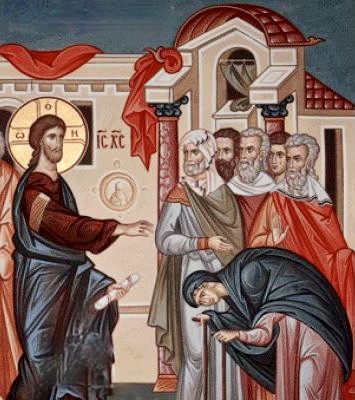
Download Podcast: "Daughters of Abraham"
We contemplate today four daughters of Abraham as the Son of God peers into life of one of them whom He actually names "daughter of Abraham" (a phrase never before heard in Scripture). She has known the spirit of fornication, and it has come to possess her. Jesus discloses that she has been bound by Satan. The Greek phrase describing her inner state is pneuma éxousa, meaning someone who is "unable to resist moral corruption"; one who is "unable to attain glorious things." God is unable to dwell in such as these because they habituate filth. How common is this? To choose animal desire over God's kind of love, which is agápe? I need hardly answer this question. For it has become our cultural normal.
Jesus now sets His all-knowing gaze upon the bent-over woman. During a period of eighteen years, this daughter of Abraham has trodden the path of clay, each year bowing lower and lower to the earthy things she has made her god. And now she is permanently bent over. She cannot, under her own power, become upright again. She is completely possessed. She bows to earth and clay, and clay manifestly will become her portion.
Withal, the woman this women seen in the synagogue on a Saturday has almost completed her journey to earth. She has become nearly all clay. What began as an error in judgment became habit. Habit became possession. And now her life, being taken over, has hardened into unrelieved prayer before an idol. She bows before the demons who first invited her into carnal life. She has trodden much farther down the clay path than the woman at the well. And now she cannot hide her secret life. Her dark devotions are now manifest to all. And then, on a day, she encountered God.
As He did with Photini, Jesus knows everything that she ever did. His singling out the detail of the eighteen years discloses that He knows the rest of the story as well. His bearing is that of a king. He does not go over to her in solicitude, but rather He summons her. He does not stand, but He is in the chair, as a sovereign. He announces her release by fiat: "Woman, you are loosed!" His words are not descriptive. They are a Divine command: the speaking of them is the doing of them.
Join us as we enter the synagogue on this remarkable Saturday afternoon. For we shall discover that the story is uncannily set in the twenty-first century, and the plot and characters depict ourselves.
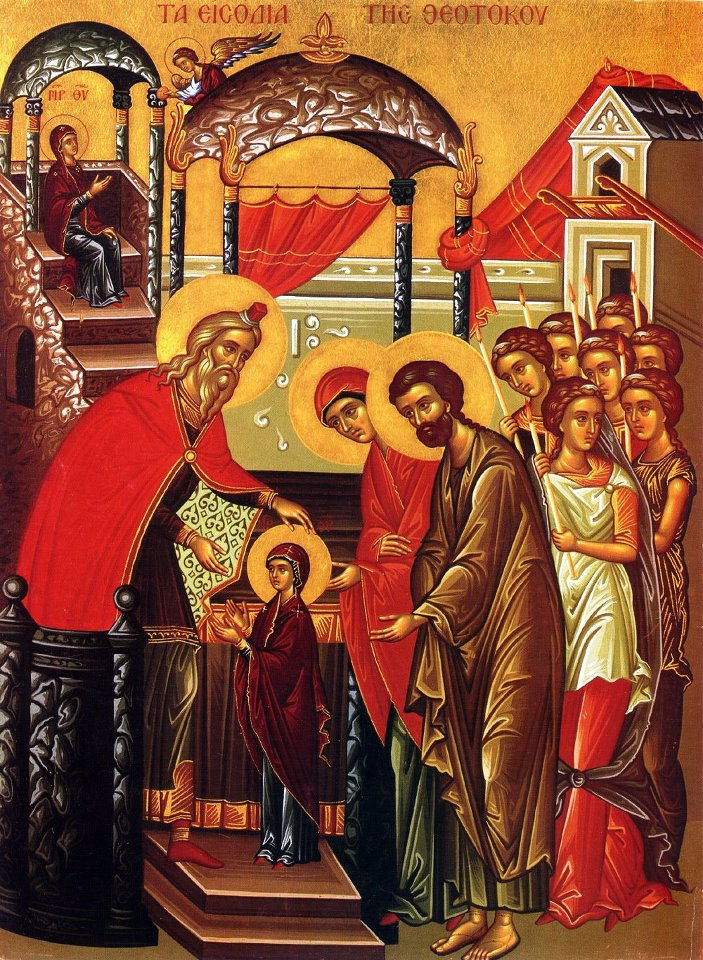
Download Podcast: "True Worshipers"
Today we celebrate one of the great feasts of Holy Orthodoxy, the Entry of the Most Holy Theotokos into the Temple. It is a momentous feast, observing the end of a whole life-world.
* * *
After the long, bitter, lifeless winter .... the sky is gray, the earth is hard, a winter which never ends, a little, delicate blossom is seen forcing itself up between the enormous stones of the Temple. A breath of fragrant, warm air is detected. These are the first intimations of spring. The ice begins to crack. The sound of dripping water is heard .... everywhere. And the centuries-old oppression begins to fall, rotting from within.
For a tender Virgin, little more than a toddler, enters the Temple. Her pristine feet are set upon the Temple's heavy steps. Her little frame proceeds past its massive columns and stones. Her innocent soul ascends toward the slaughterhouse. For she — this powerless, diminutive girl — will be the replacement for this colossal fortress. She will be the place by the grace of God, in Whom the vastness of the cosmos and beyond will dwell.
She will be the new and definitive Holy of the Holies. For in the First Temple, far from being a bloodbath of terrorized animals, the High Priest attained the furthest reach of theosis, which was perfect spiritual union with God.
Can we conceive of something above and beyond this perfection? This Virgin's body in every fiber of her being will participate with the heartbeat of God — her every cell, her blood, her bone will be intermixed with God's. Talk about union with the Divine! For a time she will be indistinguishable from God Who grows inside her. And God will proceed out of her, offering divine union to all people.
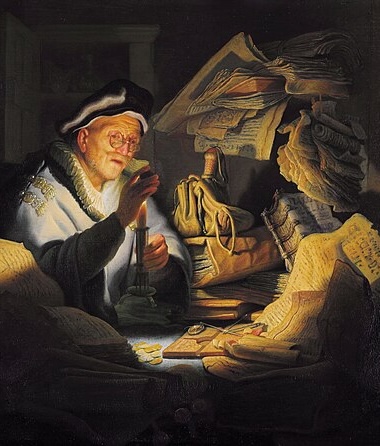
Download Podcast: "Master of the Granary"
Our Gospel lesson appointed for today is a brief parable: five sentences. In fact, we might call it a tableau. Small wonder it should proceed from our icon-writing Evangelist, St. Luke. Here we have the proverbial scene of the "king is his counting house." He is alone, of course. Around him are all his riches, and his imagination is sated. He is like the man who over and over again regales you with stories of his success: "Who could have guessed that I would attain such glory!" He thinks of nothing else and no one else. His own happiness and security chart the fullest extent of his thought-world. He seems to think that he is master even of his destiny. But, of course, we are never alone, and all our thoughts and words never go unheeded. We live our lives in the brilliant light of God's judgment. Accordingly, this brief parable features two characters: the rich fool and God. This is the literal level.
The allegorical level opens to us as we look to Scripture for other rich men who are masters of the granary. The most imposing figure, of course, is Jacob's son Joseph. We imagine his granary doors to be high gates, indeed, for they enclose the granaries of mighty Egypt. But if Joseph has "built greater," he has done so in order to achieve the happiness and security of each Egyptian family as he prudently stores up grain against a time of famine. He characteristically thinks not at all about his own gain.
As we search through the four canonical levels of Scriptural interpretation, join us. For we have begun our journey to a crib side. And our right and meet work especially in these weeks of our most holy expection is reflect on Scripture, and He did.
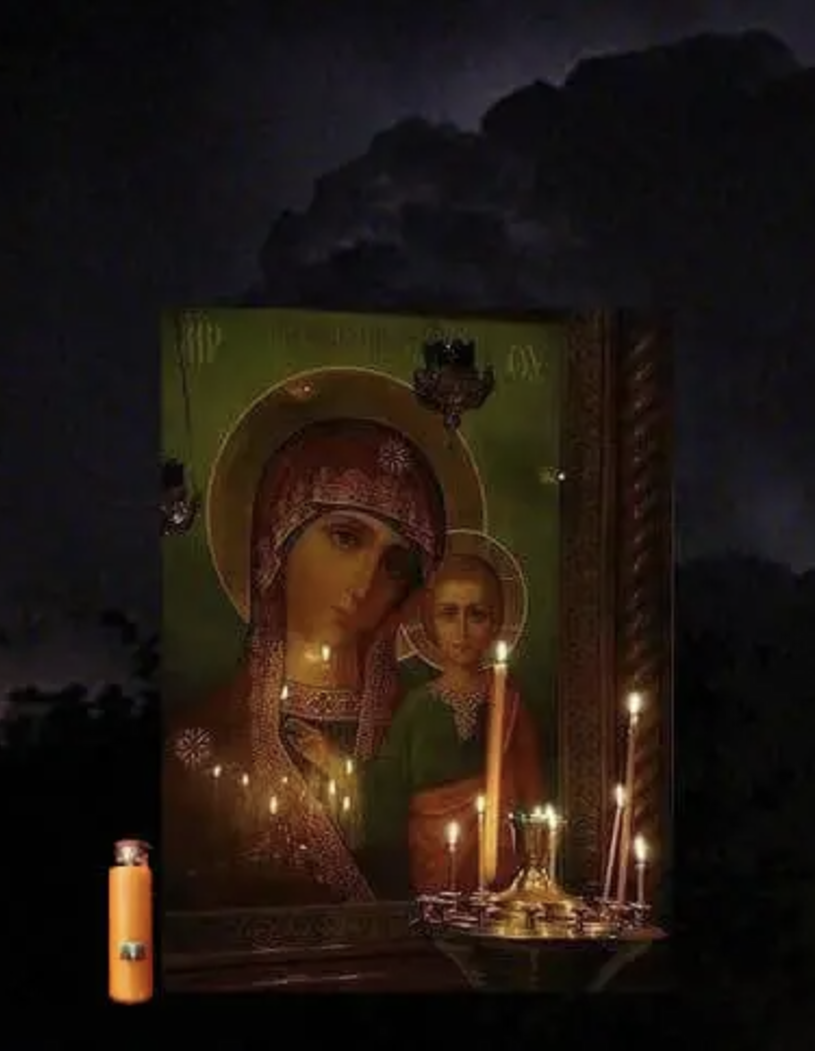
November 27, 2024 (November 14, Holy Calendar), St. Philip's Fast
"Follow me." (Jn 1:43) These were words we read yesterday in our Gospel lesson. The world was in darkness when He spoke these simple words of hope.
Darkness was falling. The light was failing. God's people languished under a double-yoke: Roman occupation and the deceitful promotion of Judah-ism, distancing God and His true worship. But God heard. God did not forget. And God would be born even among us.
Let us hasten down the road to Bethlehem. Who can eat?! Who can tolerate distractions?! The Light of the World is being born to us! And of His Kingdom there will be no end.

As were all of the Twelve (except Judas Iscariot), St. Philip was born in the historical Northern Kingdom. It is not accurate to call him a "Jew," which signified an ideology outside Judah: "Judah-ism." According to St. John the Theologian, the day after Jesus called Andrew and His brother Simon, he called Philip and Nathaniel, who He termed an Israelite in Whom there is no guile. The Eleven are all Israelites — guileless and sincerely seeking God. That is, they are Abraham's true sons and Hebrews — still strong in Samaria and Galilee. Jesus tells them that He saw Nathaniel beneath a fig tree, implying to them all a return of good and sanctified times — each man dwelt safely under his vine and fig tree, from Dan as far Beersheba (1 Kings 4:25). And they would see Heaven open and the angels of God (Jn 1:25). Indeed, these were heady days.
![]()
Download Podcast: "Who Is My Neighbor?"
The occasion for the Parable of the Good Samaritan — one of the most important Gospel passages explicating the Advent of God — is often depicted as a bitter encounter with an accusing Pharisee.
But there is nothing in the underlying Greek text to support this reading. In fact, if the general background for this encounter were considered, most readers would come to the opposite conclusion.
Let us consider the setting, the characters, and the plot carefully and then sort through the meaning of the Parable and its purpose in Jesus' teachings.
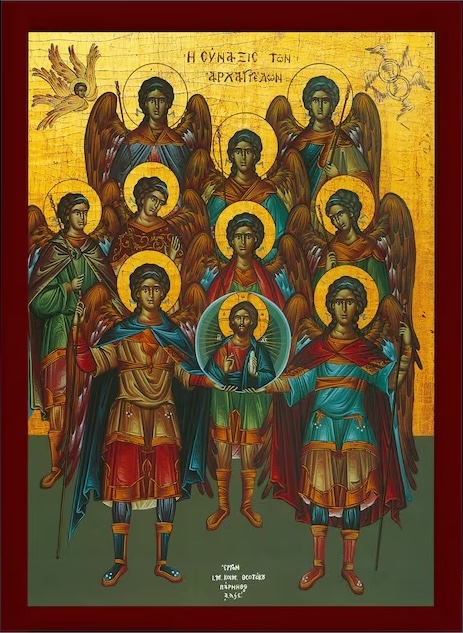
Download Podcast: "You Shall See Angels"
Why do we call Archangel Michael, always depicted as a Man-at-arms, the "Prince of the Heavenly Host"? For that matter, why is the Synaxis of all Angels (or Bodiless Powers) called a host? In the first century the word host was intrinsically a military term. It had no other meaning. And the Angels are inherently warriors. That is their nature. Their God is called "the Lord of Hosts" more than 200 times in the Bible. That is, YHWH, their Master, is intrinsically a Warrior.
Heaven has has been marked (or should we say "gored") by rebellion, and earth, to which the vanquished fell, is a dangerous place. Accordingly, we are inducted into the ranks of God at our baptisms, swearing our allegiance to Him and declaring our everlasting enmity against the forces of Satan. It is right that this is the moment we receive our Guardian Angel. He is a guardsman and fitted to defend us.
St. Kosmas of Aetolian said without understatement that
Life is spiritual warfare. If you are not fighting, then you are losing.
This is the nature of things. We must struggle to attain the Kingdom of Heaven. For in our condition of freedom, warring impulses, a conflict among choices, a war between two minds is always the case. This is the nature of free will.
On this great feast day, let us re-dedicate ourselves to the Heavenly Host. Let us renew and refresh our baptismal vows, for this battle will rage until we consent to God. Till then we shall have no peace. How could we while God and His Angels must fight unending rebellion?
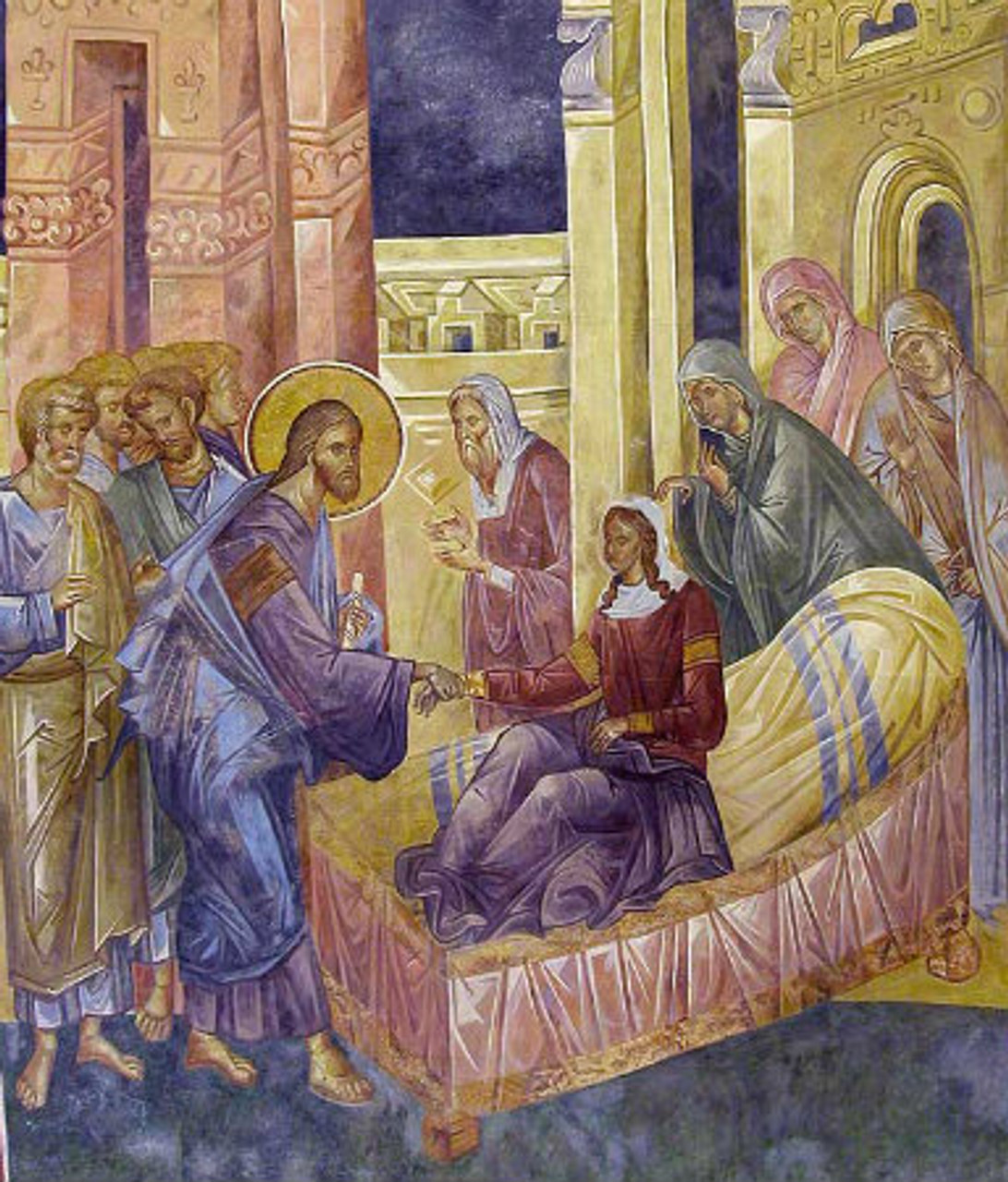
Download Podcast: "Two Ways There Are"
For centuries readers have marvelled at the Gospels for their awe-inspiring spareness. For the most expansive subject imaginable is expressed in so few words.
The subject matter before us is a case in point. Having revealed His Divine Identity, Jesus then openly displays His purposes — to expose the way of death and to invite all into the way of life. But there is so much to say: the way of Abraham and Melichizedek set against the blood-sacrificing Temple; the culture of the Northern Kingdom set against the ascendent Southern Kingdom; the traditions of Isaiah set against the Second Temple prophets; the ways of Heaven and servanthood set against the grasping culture of Sadducees; the Sermon on the Mount set against the Laws of Sinai .... the list is a long one that would occupy many hours to rehearse. Yet the sublime artist, St. Luke, renders it in a few scenes. He has opened the Divine to us through windows to Heaven.
Let us enter into this mysterious place where he has done so much with so little. Let us reflect, for he reveals the marvelous, the filled-with-grace, and he shows us the way to the Kingdom of Heaven.
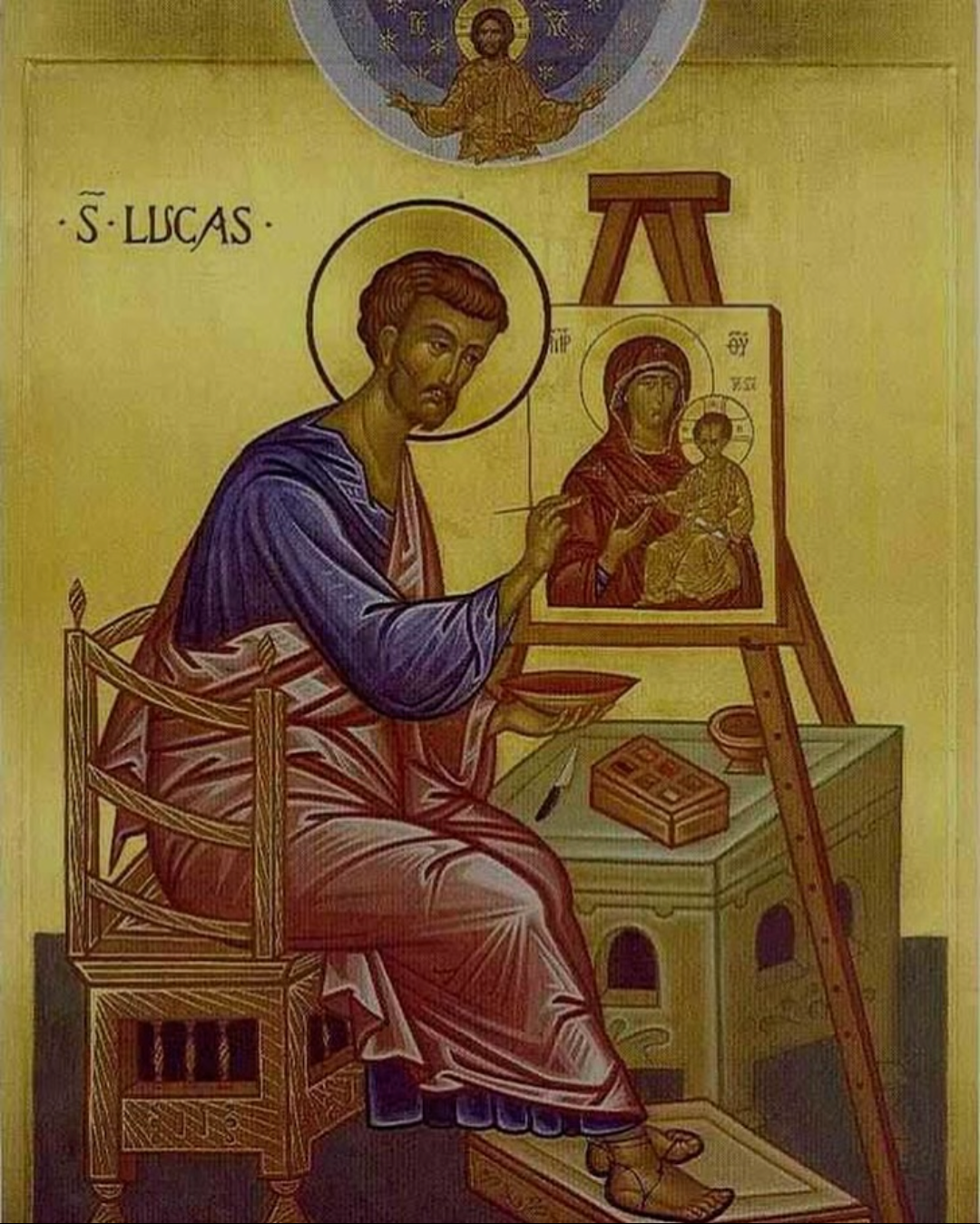
Download Podcast: "God Among the Ruins"
Who could rise to the heights of telling this most extraordinary tale in human history? God roams the ruins of the world that He made. His people are demon-possessed, wholly entranced by the lowest things in their nature, feeding on the garbage of their animality. They tread the path that leads to incurable disease and eternal death. To make matters worse, they are inured to worshiping a god, who is not Himself. Indeed, the forgotten true worship, mindlessly offering blood sacrifices and forbidden to mention His Name. How can He turn them away from these vile habits? How can He rouse their spirits from these deadly stupors? How can He turn their faces back towards Heaven?
To tell this tale one had to draw on all that learning and spiritual journey had to teach. One had to draw on the highest rhetoric that could be mastered. And one more thing: one had to be elevated by the inspiration of the Holy Spirit.
The erudite and highly literate physician Luke had a vocation to write a Holy Gospel. He was the master of many fields ranging from what we would call the sciences, the fine arts, and the liberal arts, including philology and an interest in Hebrew culture. We have spoken about his painterly style of writing. Today, let us reflect on more of St. Luke's gifts. For He was chosen by God to offer to us a dazzling work of his deepest arts.
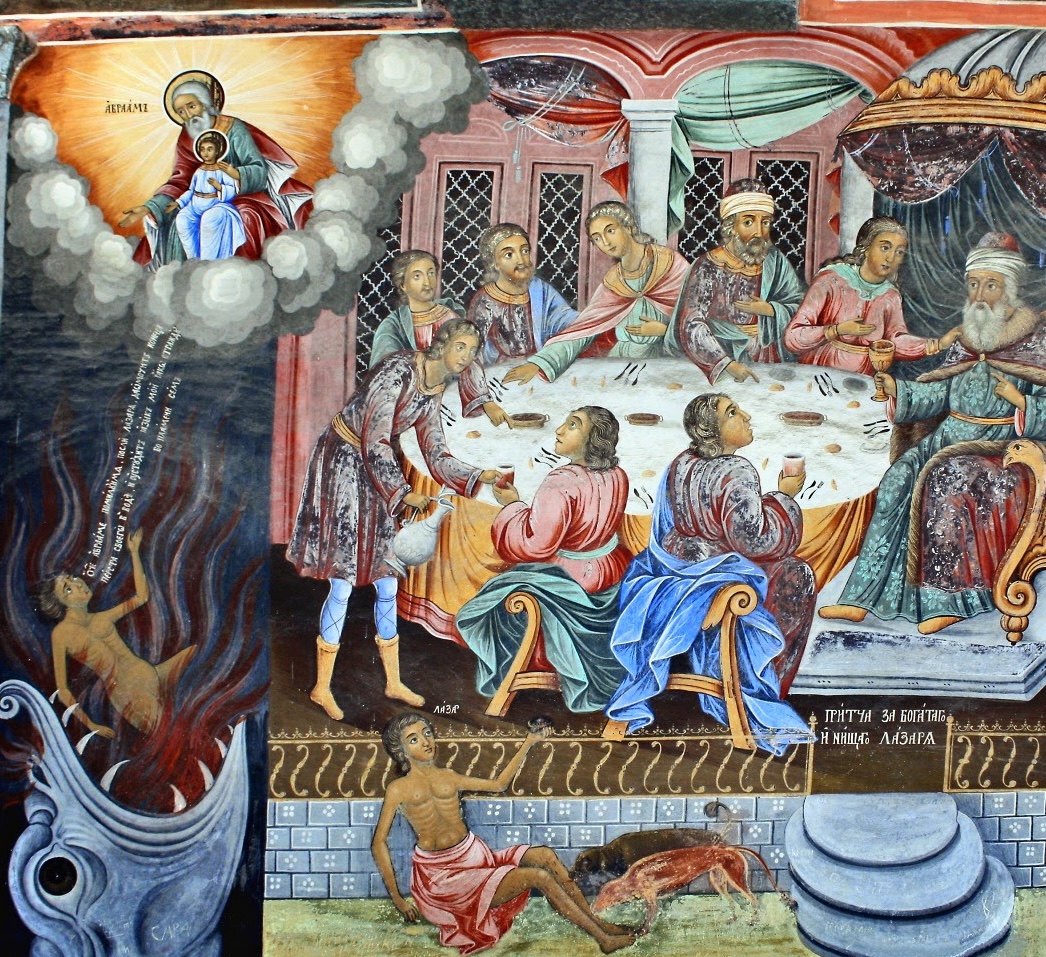
Download Podcast: "All There Is"
Here in the week when we venerate the Evangelist and (with St. Paul) Apostle, St. Luke, we again reflect on one of his icons written with words. Aside from his works as a painter of icons, his written Gospel is a veritable icon book.
The present artwork is an icon of all there is. In it are depicted God's principal creations, where are boundless and eternal Hell and infinite and everlasting Heaven. Included is that limited and temporary creation we call "the world." And one more thing: the creation for which God mysteriously has made all: Man.
Our Gospel lesson presents what is perhaps Luke's primary icon. Not only does it include everything, but it also presents us with a paradox which goes to the very heart of God's Creative Genius.
Please join us as we gaze on St. Luke's divinely ingenius art imitating His Master.
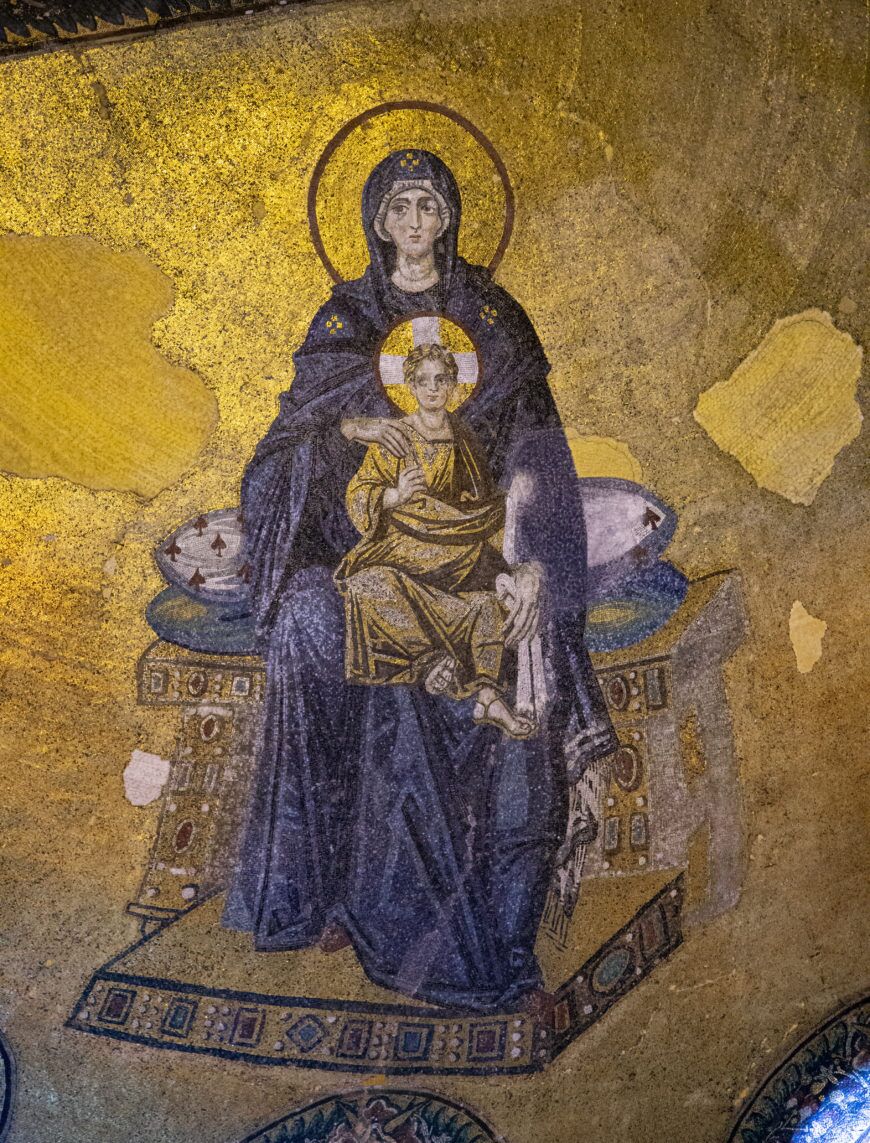
Download Podcast: "The Un-secret"
Today, we reflect on a world intent on destroying the holy, brought into sharp focus by iconoclasm, which literally means "to smash icons." The Second Council of Nicaea (seventh in the sequence) was convoked to settle this controversy which threatened to rupture the Church.
Icons are not art. They are not the comforting familiar. They are the un-secret. They are the eyes of eternity looking out on the unredeemed world and on the world's desperate attempts to paper over the unspeakable and to domesticate the unutterable.
And in our grave sins against God, vainly eradicating the holy (as if we ever could) — whether they cry out to Heaven from eighth-century Byzantium or from Soviet atheism burning churches, smashing icons, and murdering 100,000 clergy or, in our own time, defiling and desecrating the Eucharist in giddy public ceremonies .... — be sure of this: the sober eyes of eternity look on. They continue their holy witness, and they set out a mirror to us disclosing the real even as we frantically attempt to conceal our true natures, the true meaning of life, and the ultimate reality of everything.
But the eighth century has vanished like a dream, and all empires turn to dust. Without fail, the eyes of the Holy Ones look on forever from perfect light. In the poet's words,
|
An aged man is but a paltry thing,
A tattered coat upon a stick .... O sages standing in God's holy fire As in the gold mosaic of a wall, Come from the holy fire, perne in a gyre, And be the singing-masters of my soul. Consume my heart away; sick with desire And fastened to a dying animal It knows not what it is; and gather me Into the artifice of eternity. (William Butler Yeats, "Sailing to Byzantium") |
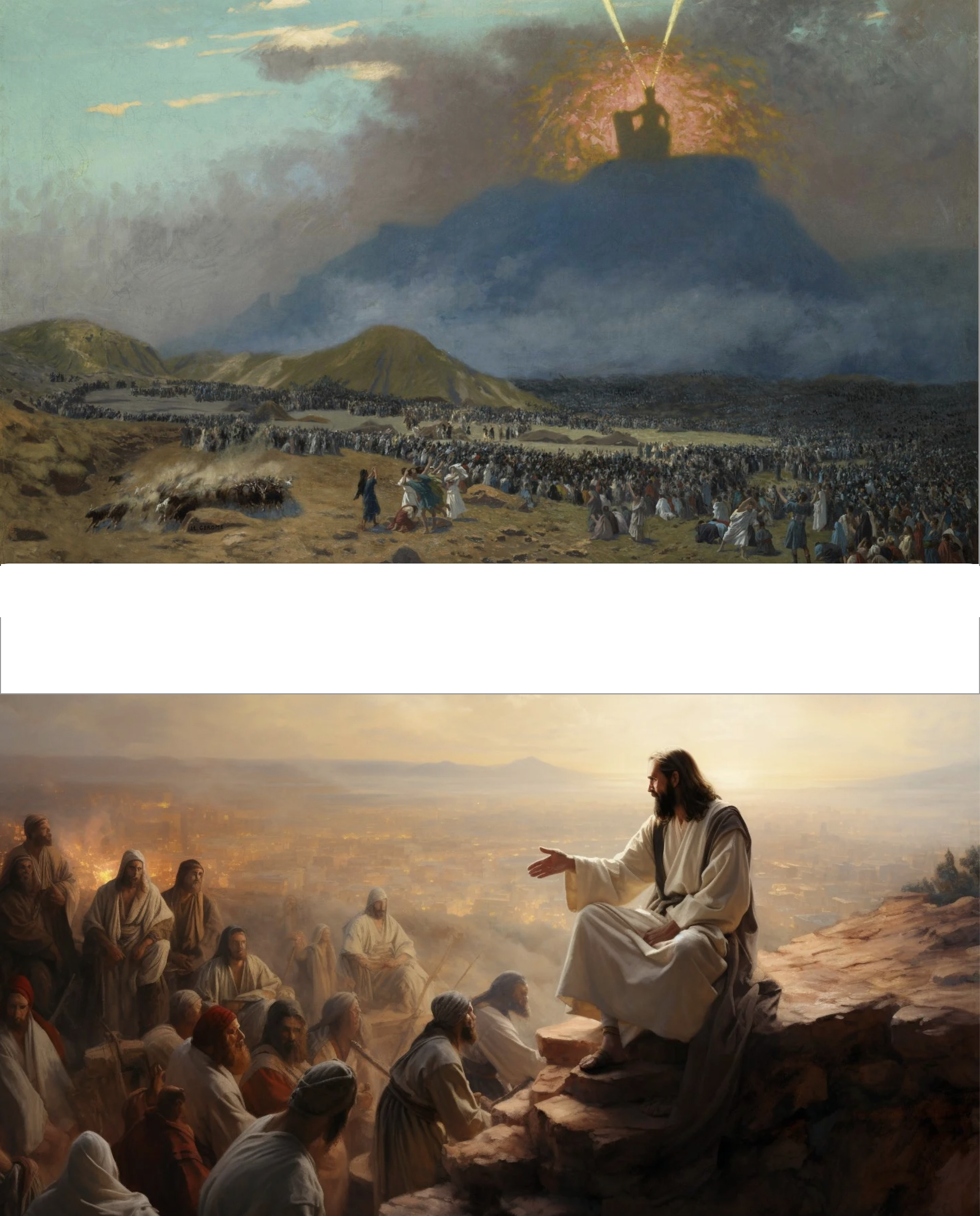
Download Podcast: "Upon God's Holy Mountain"
When it comes to Scripture, we are often "text-oriented," using individual words to open hidden roads from passage to passage. But St. Luke, our proto-icon-painter, departs from the other Evangelists conspicuously conceiving these holy events in term of images revealing divine mysteries.
Now, this is not news to our readers. We have been exploring this aspect of Luke's art for the past ten years: his two, companion icons (a dyptich) of Gabriel's divine visitation to Zacharias and then to Mary; his depiction of Pentecost as an "operatic" stage set featuring a locked upper room opening out onto a many-peopled Jerusalem — sweeping, grand spectacle; his other "arias," assigned to Mary (the "Magnificat,"), to Zacharias (the "Benedictus"), and to Simeon (the "Nunc Dimittis"), anticipating grand opera by more than a thousand years.
Last week, we were again ushered into the holy precincits of his expansive art, taking in another dyptich: Last week, we were again ushered in before a great dyptich, the Sermon on the Mount hinged beside the fiery summit of Mount Sinai. St. Luke actually depicted only the former. The latter he implied. But the contrast between them was the mystery he sought to unlock. The work could well have been titled "God upon His Holy Mountain" — a bold contrast between the God-Who-Is, Who-Is-with-Us, and the distant, forbidding figure worshipped in the Jerusalem Temple.
But it is not a simple contrast: the Laws the Lord Jesus gives from the Mount are not less rigorous but rather more so: prohibitions not merely on murder but even on anger, not merely on adultery but even on lust or sexual fantasy, not merely on false witness but even on giving any oath. We are to love our enemies and do good to those who mean us harm. The point of the two-paneled icon is, God does not seek merely slavish rule-followers. He seeks friends (Jn 15:15). He wants to transform our hearts that we might enter into true fellowship with Him, indeed, that we might become His adopted children.
The image of the mountain is crucial if we are to understand the following chapter, Chapter 7, as we find Him roaming about Galilee doing what we might call "the works of the Holy Mountain": — healing incurable diseases, raising the dead, and announcing the good news.
How beautiful upon the mountains,
Are the feet of him who brings good news ....
![]()
Download Podcast: "Under Her Mantle"
We at the Hermitage live only two timezones from the eastern shores of the Russian Land but about 7,000 miles from Moscow (such if the breadth of the Russia). But we join them today in a blessed Feast venerating the the Protection of the Most Holy Theotokos. In Russia, the hustle and bustle of daily life stops in order to bow before our Most Holy Mother, but in personal terms. From individual apartments in Moscow to snow-covered cabins in the Taiga, people draw near to her in her icons and speak to their Most Holy Mother. For it is Her care for us, Her desire that we come to no harm, which we reverence.
The Feast of the Protection of the Theotokos is among the most beloved of feasts among the Slavic peoples. The signature cathedral which we associate with Russia, called St. Basil's in Red Square, is formally known as Pokrovsky Sobor. The Russian word pokrov meaning "cover" generically but in particular on this feast day, "mantle" or "veil." The Most Holy Mother of God shelters us "under Her mantle" and under the protection of Her intercessory prayers — all expressed in this word, pokrov.
On this day especially, remember Your Most Blessed Mother. Her prayer is simple: that each of us be the apple of Her eye and that each live under the shadow of Her wing.
|
Pray for us, O Most Holy Protectress!
Keep us under your holy Mantle! Help us to grow into the fullness of your prayers! Help us to become worthy of the promises of Your Son! |
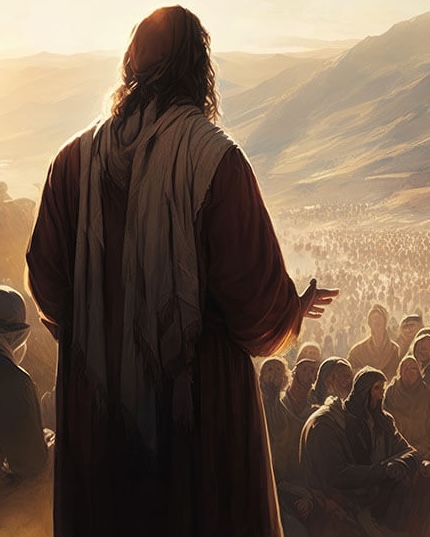
Download Podcast: "God's Kind"
For centuries people who do not necessarily believe in God have pressed Jesus into service as their spokesman. He is the "apostle of kindness," they say. And the Gospels form the world's classic text on being kind. But here is a surprise: the words "kind" and "kindness" in their sense of gentle compassion appear only once in the Gospels: Luke 6:35, and there as part of a distinctly otherworldly discourse. As countless writers have pointed out, the Incarnation of God was not to offer advice on virtuous living in the world. In fact, the opposite is true. The Life of Jesus calls us away from the world to an entirely different kind of life — a marvelous Kingdom which Jesus says over and over again is plainly not compatible with worldly ways.
No question, Jesus teaches us. Certainly, He calls to us. But He calls away from our worldly lives to be with Him far away from what we know to a new way of seeing and a new way of being.
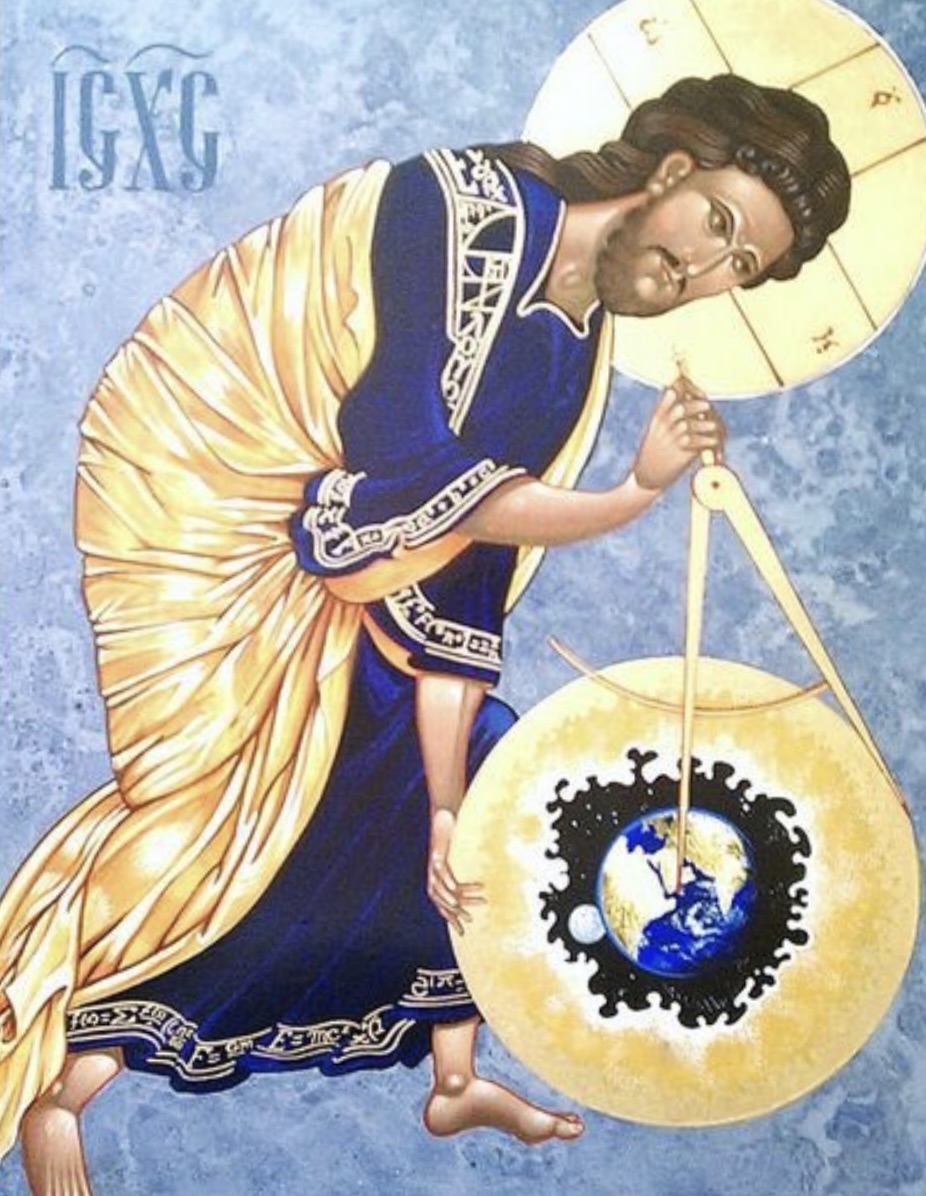
Download Podcast: "The Holy Circle"
The secular way to account for the movement and motions of our planet with respect to the sun is marked by four annual events: the Winter Solstice (when the sun is farthest south); the Vernal Equinox (when the sun is over the equator); the Summer Solstice (when the sun is farther north); and the Autumnal Equinox (when sun is again over the equator), which we perceive to be its yearly journey. (All this is from the perspective of the Northern Hemisphere because the people who first made these calculations did not know there was a Southern Hemisphere.)
But we Christians regard all such distinctions to be secondary, as things indifferent. We draw our measurements from things holy: the Annunciation signifying the Conception of God within the material Creation (readying us for His Nativity nine months later) and the Conception of His Forerunner (preparing us for his birth nine months later). In our way of seeing, their births, six months apart, mark the pivotal moments in the history of the world.
That these holy conceptions and holy births should occur at the four corners of the year might appear to be a wonderful timing of biological events. But I think of this as being even more basic, more elemental in the ordering of our world. That is, I believe that the very structure of everything we perceive is patterned upon Him, the Lord God Jesus Christ. That is, the Holy Ones come first, and our physical reality attends upon them. And why shouldn't this be the case? Why shouldn't the physical universe and movements of the heavens be about Jesus, the Logos? He created them. And they find their source and origin in Him Alone, Who was before all worlds.
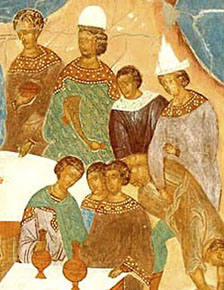
Download Podcast: "Love Marriage"
The King of Heaven arranged a marriage for His Son.
This marriage to the world would be celebrated, would be solemnized, would be consecrated upon the Holy Cross. For what is the great difference between a God Who emptied Himself, the Suffering Servant, the All-Holy and Divine God humbling Himself unto earth and the Cross? What is the difference between a Passion that began at His Conception and lasted three decades and the sufferings of a few days?
On the Cross was perfected the terrible privations of this marriage. On the Cross was put on stark display the neglect and abuse that had been heaped upon God's Son from the time of His Birth. On the Cross was no longer hid the enormity of what the world had done — and all He endured that the world might be reconciled to Heaven. No, His marriage would not be to a comely and chaste bride, who deferred to His Royal character. But it would be a thing of sordid confusion, of defilement and degradation, of adulteries and treachery, and of common filth.
The Cross is the place where the twisted world must square with the perfect lineaments of Heaven. It is a place of unbearable torsion: where demons cry out, where oceans boil, and gales blow. It is .... the end of the world. Yet One has been sent as a Bridegroom Who presides over the world's end, Who will banish demons, Who stills the winds and calms the seas. And He bears with Him the instrument of His intrinsic rectitude: the Cross with its perfect geometry, where mercy intersects with justice. He saves the world with this Life-giving rightness, this sanity, this goodness.
Thus, the Cross endures as the symbol of the most heinous crime humanity is capable of and a world that is healed and reconciled to God. It is the symbol of God's faithfulness to the last and of a love that cannot fail. It is the sign and seal of His marriage.
He is Heaven, and Heaven is none other than He. He is Judge of the world and the measure of all things. He is the Alpha and the Omega. And He surveys the whole span of human experience — every darkness, every depravity, every failure. And it is His will that all things be made right. Even at the moment of our greatest crime against Him, yet He stretches His arms out to embrace His bride and to heal her with that fearful geometry we had designed as a torture for Him.
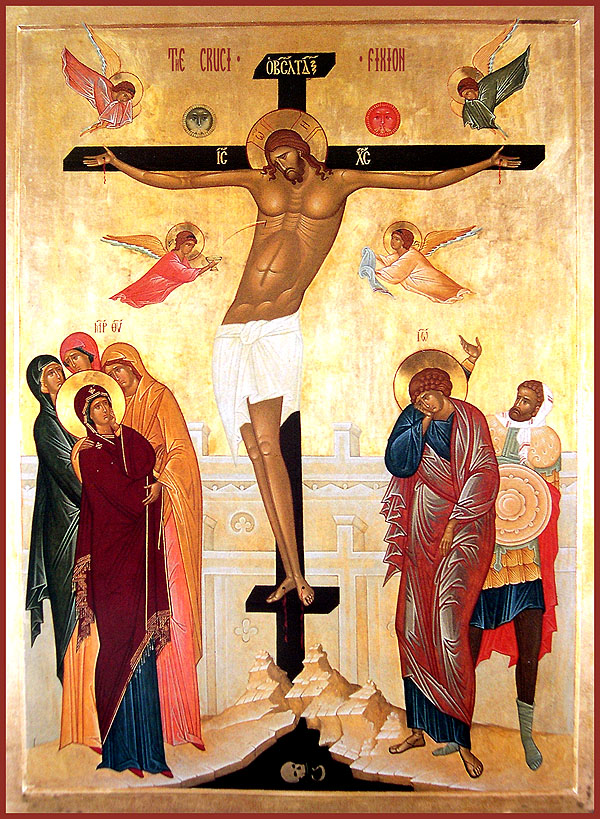
Download Podcast: "Take Up Your Cross"
What does it mean to pick up our crosses and follow Him? After all, this is a basic condition of becoming a Christian. It means that our worldly life, our old ways of seeing and being, must be crucified and killed. Our worldly selves must be buried and forgotten .... never to be monstrously dug up and revived.
We must go forward with a new way of seeing and hearing and being. We must clearly hear God when He speaks to us .... and reply. We must see Him clearly, free from polluting influences. Only by doing these things can we begin to follow Him and begin our journey to His marvelous Kingdom.
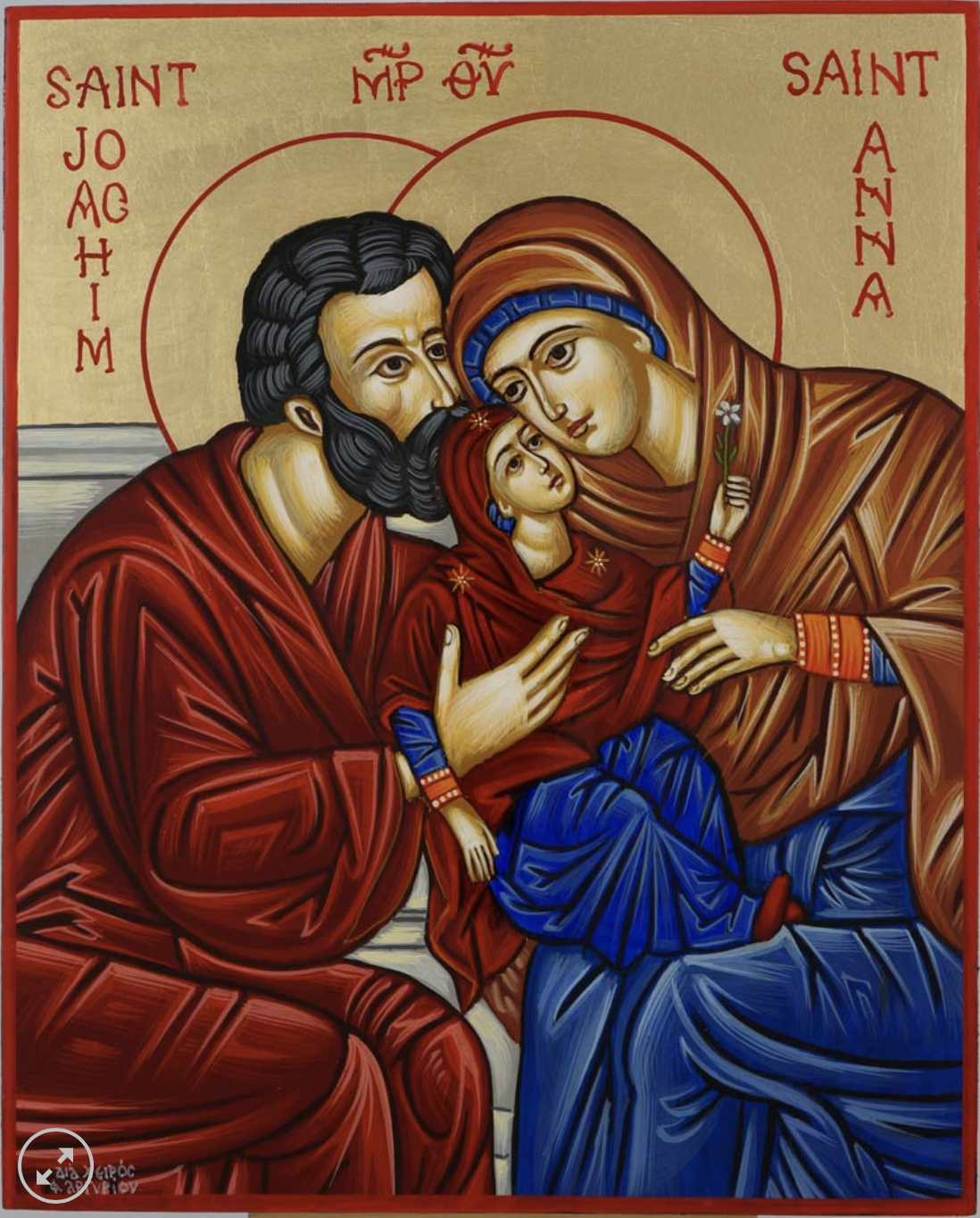
Download Podcast: "The Two Ways"
The proto-icon painter St. Luke has provided us with a dyptich — two hinged-together icons, each explicating the other. But he has painted them with words. His great theme is nothing less than the nominal purpose for the Incarnation of God, which is the gathering of the lost sheep.
Formally speaking, these icons are quite similar to each other: the barren couple. One couple is in a religious tradition which God deems to be a failure of faith. The other is in an exemplary religious tradition, representing the true ways and looking back to Abraham and Sarah, God's exemplars, which are types of the Kingdom of Heaven. Yet God will use both, the anti-type and the type, to set the stage for the salvation of humankind. Each, in its way, will surely be instructive for us, for they speak to our own age with its "check-list religion" on the one hand and the lively, religion of the heart and hand, on the other.
Come, let us appreciate the handiwork of the great icon-writer, St. Luke. And let us reflect on our lives as we gaze into these mirrors, which he has set out for us.
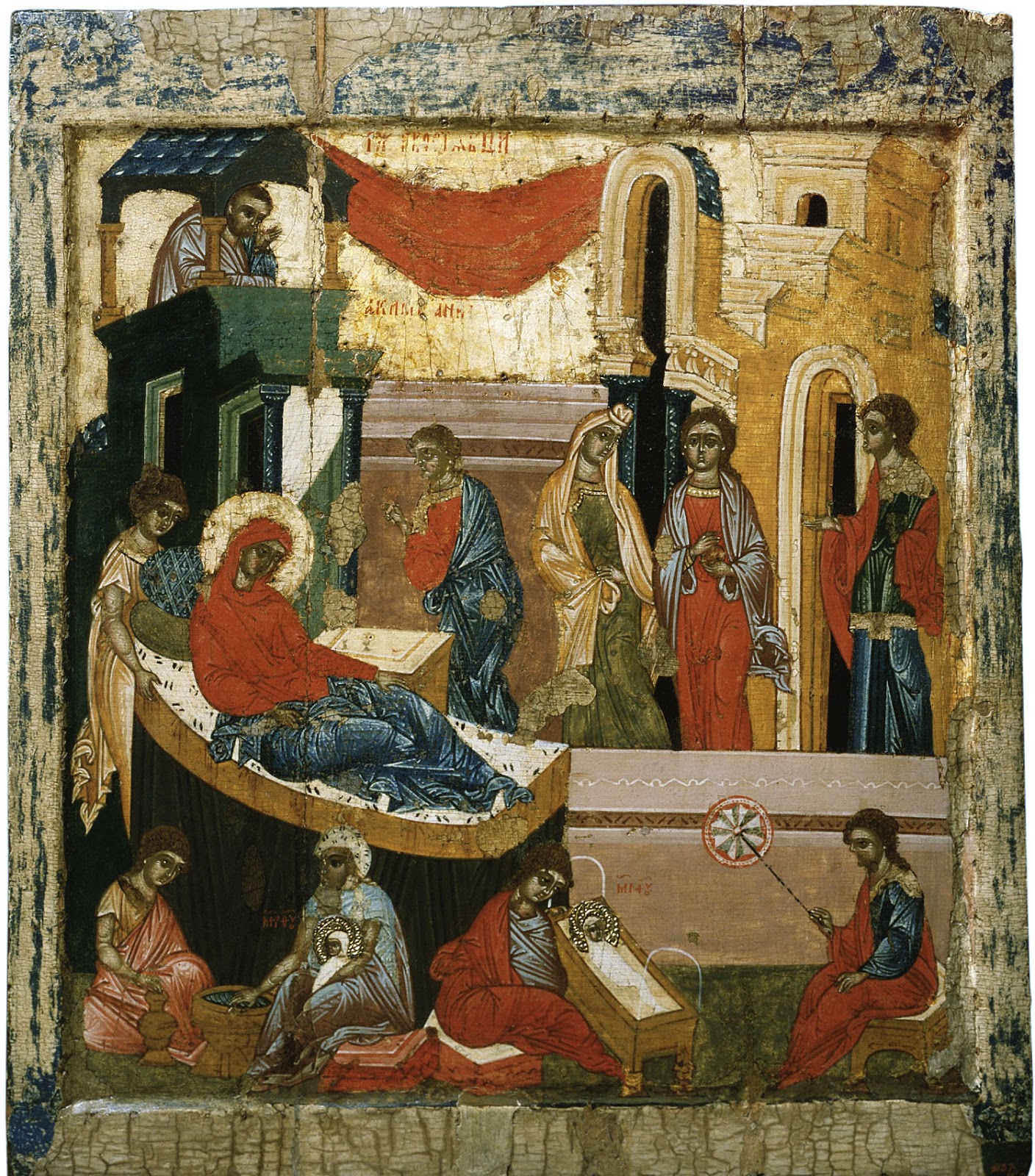
Download Podcast: "The Gates to Salvation"
Everyone is familiar with "the gate of life," for we have all passed through it. It is sacred and protected by God with holy commandments that it not be slighted or abused or defiled. On the contrary, we must revere this holy place and approach it with awe, for it has been set aside by God as a most holy sanctum. For the gate of life through which we all have passed to take our first breath in the world is the path God has prepared to effect our universal salvation. It is generational in all senses of that dynamic and life-giving word.
At the Nativity of our Most Holy Mother, let us ponder God's handiwork, which touches each of us personally yet reaches out in its meaning to Divine and cosmic dimensions. Let us step beyond our wonted ways and open our minds and hearts to God's way of perceiving and being. For this is the way of eternal life.
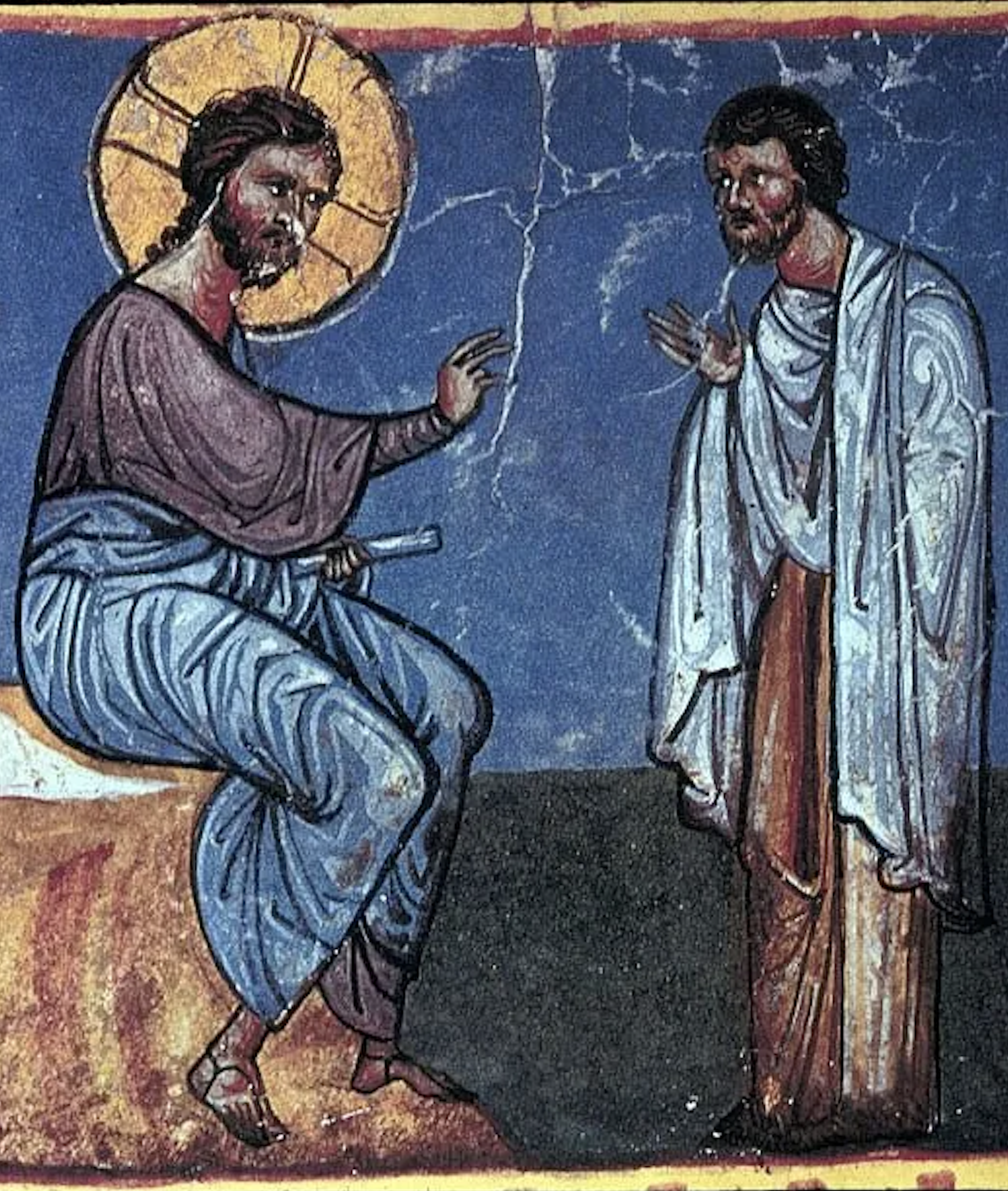
Download Podcast: "Won't the Books of Moses Save You?"
The young ruler's task is one set before all of us. The irony about true Christian life is that it is well within our reach. But it must always begins with a decision made at a crossroads: the things of the world or the things of God. St. John, our highest earthly authority, says it simply and plainly:
|
Do not love the world or the things in the world. If anyone loves the world,
the love of the Father is not in him. (1 John 2:15) |
And the Teachings of the Apostles (the Didache) begins this way:
| There are two ways, one of life and one of death; but a great difference between the two ways. (Didache, 1.1) |
In effect, Jesus says to the ruler of the Academy of Moses, "So, won't the Books of Moses save you?" There is something more, much more. We are invited not to read about the ascent to the summit of Sinai, but to ascend Mt. Sinai ourselves and to see God Face-to-face .... as even the synagogue ruler now does on a roadside somewhere in the Levant.